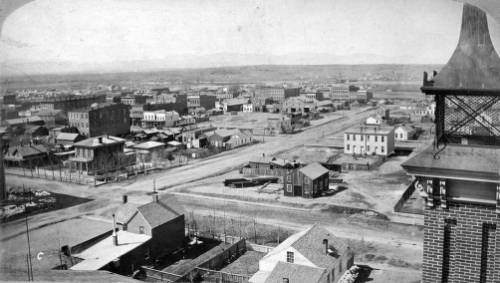
In 1871 Henry McCarty (Billy the Kid) arrived in Denver with his mother Catherine, brother Joseph (“Josie”), and William Antrim.
BEFORE
The McCarty Family: New York City 1859-64
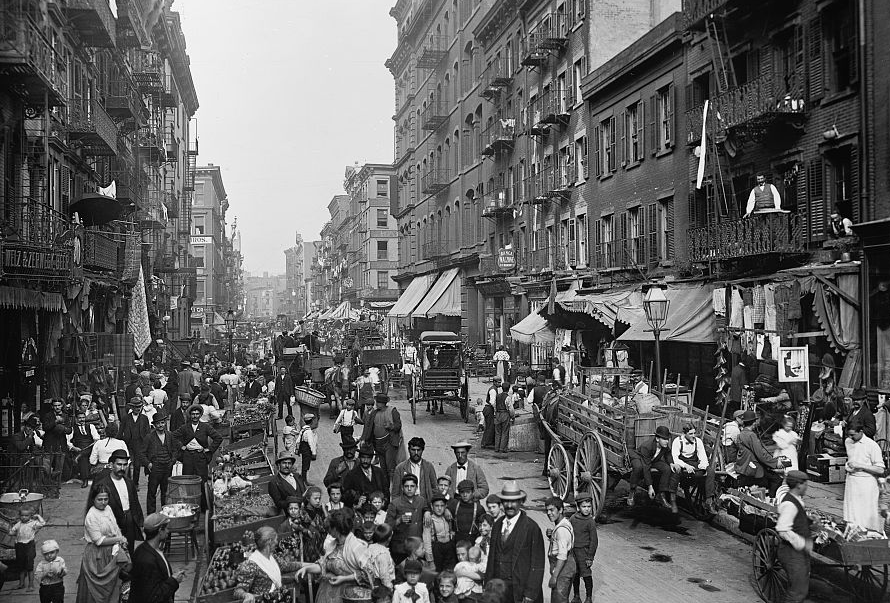
It has been suggested that Henry McCarty was born in New York City in the latter half of 1959 to Patrick and Catherine McCarty.
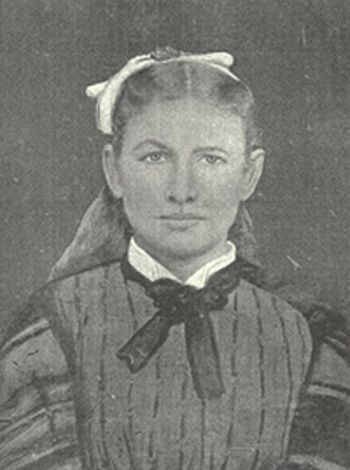
An 1860 census shows a McCarty family living in the 1st Division, 1st Ward in New York City. Residents include Patrick (30), Catherine (29), Henry(1) and a sister named Bridget(7). A brother named Joseph (Josie) would have followed in 1863.

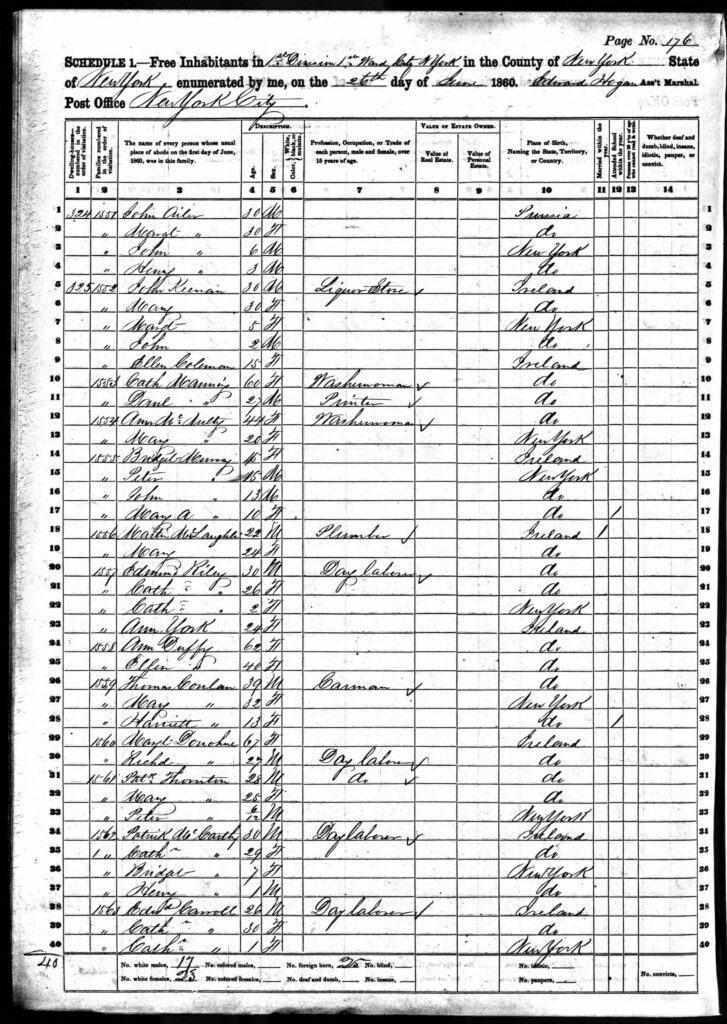
Patrick McCarty died c1864. It’s not known how he died. It’s also not known if he was ever drafted or enlisted. A couple of “Patrick McCartys” are buried near New York City who died in 1863-64. Regardless, Catherine soon after Patrick’s death moved the family to Indiana. If Bridget was a sister of Henry and Joseph, it doesn’t appear that she went west with her mother and brothers.
1865-67: To Indiana
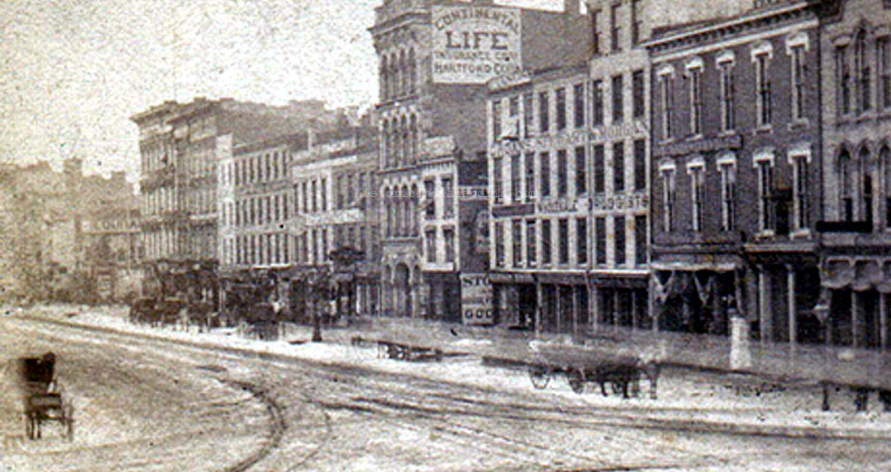
Catherine appears in the 1867 Indianapolis City Directory living at 385 North New Jersey Street. She is not found in records after 1867. While in Indiana she met William H. Antrim, who in 1867 lived at 58 Cherry Street. William Antrim was the son of Levi Antrim.
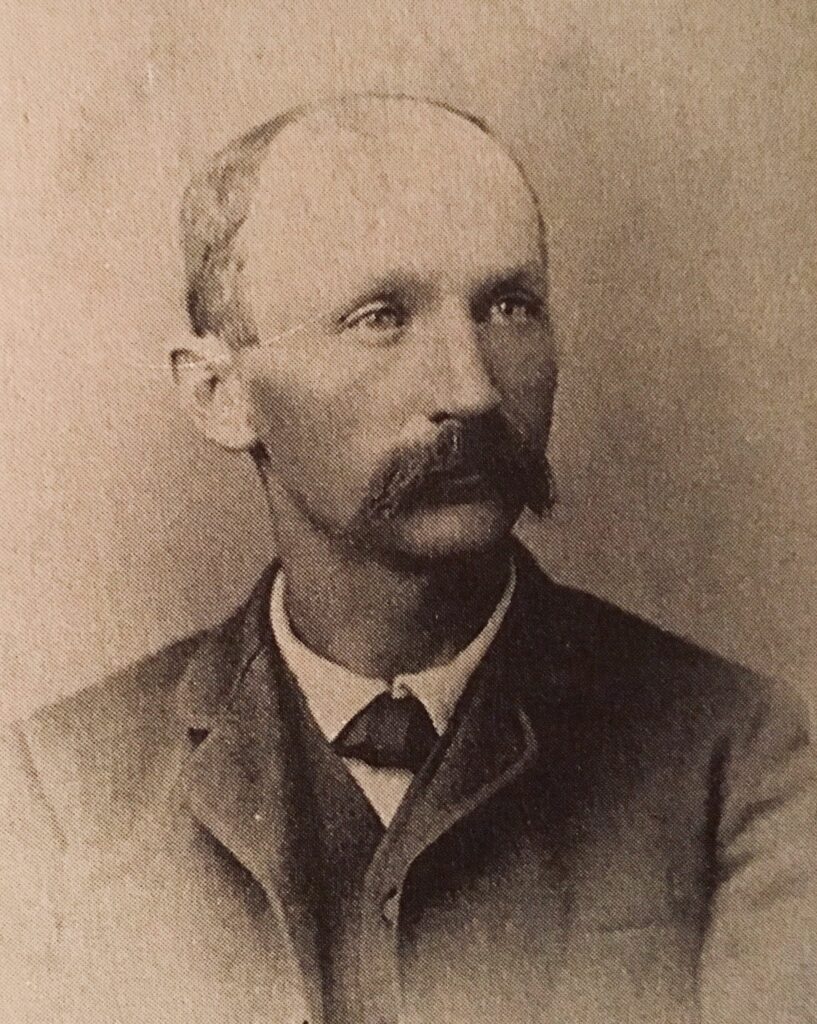
The 1870 Indianapolis City Directory listed the residence of W. H. Antrim as 70 Plum Street. William H. Antrim was not listed in the 1870 census of Indianapolis, likely due to the McCarty family and Antrim heading for Kansas.
1870: To Kansas

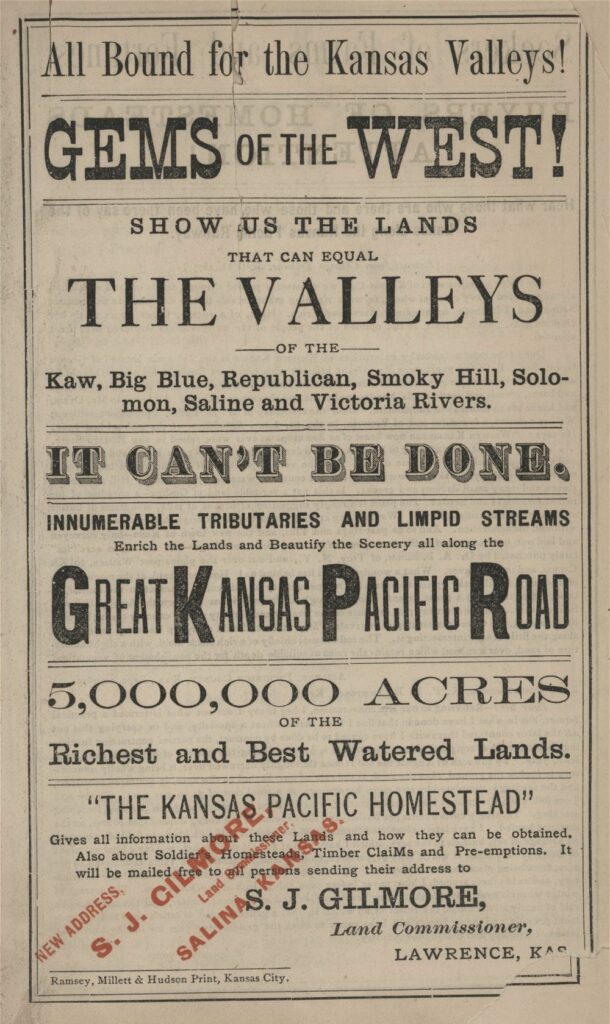
In the Spring of 1870 the McCarty family moved with William H. Antrim to Wichita, Kansas.
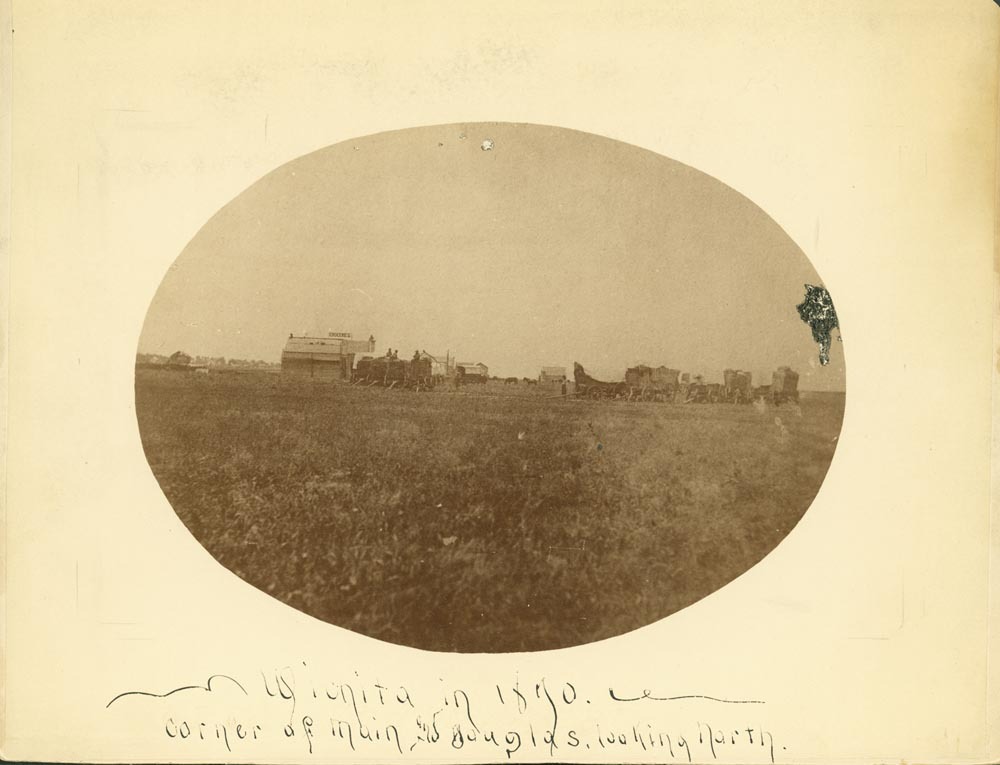
It’s possible the move out west was due to Catherine’s health. Or, perhaps like so many others, they went west to seek their fortunes. Wichita was a small cow town in 1870, but quickly growing in size and population.
On July 21, 1870, Catherine was the only woman of 124 persons to sign a petition presented to a probate judge calling for the incorporation of the town.
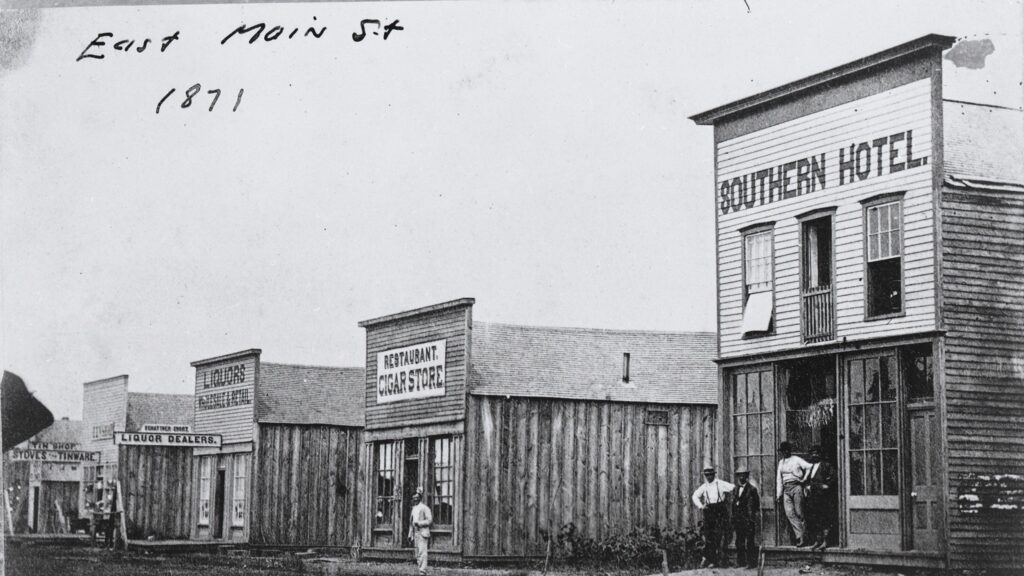
Catherine set up a laundry business on Main (Court St.) Street in Wichita while William Antrim filed on a section of land six miles northeast of Wichita where he built a cabin and started to cultivate the land.
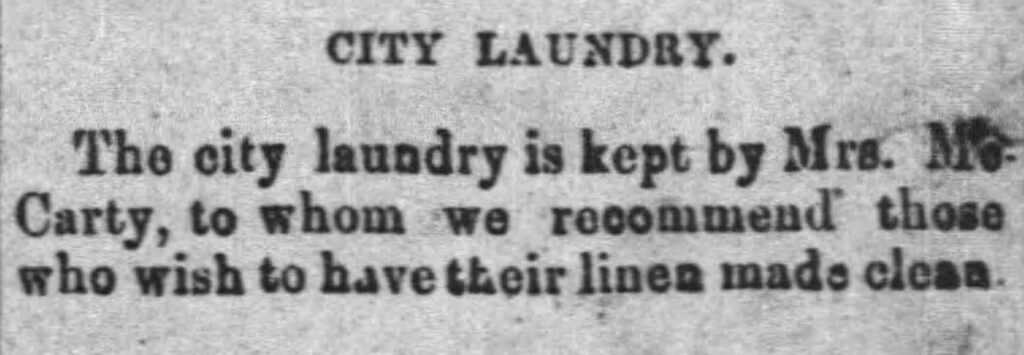
Catherine and William also bought several parcels of land including the property where the laundry was located and some on what are now Market and Main Streets. Catherine also purchased a parcel of land adjoining Antrim’s, and with the help of William and her sons they built a small cabin in which she and the boys lived. Antrim supported her claim in the land office:
“I have known Catherine McCarty for 6 years past; that she is a single woman over the age of twenty-one years, the head of a family consisting of two children, a citizen of the United States, and a bona-fide settler upon the foregoing described land, which she seeks to purchase, having settled thereon about the 10th day of August, 1870; on or about the 10th day of August built a house upon said lands, 12 by 14 feet, 1 story high, board roof, one door and two windows.”
Antrim then described other improvements and declared Mrs. McCarty moved into the home on March 4, 1871. Their stay in Kansas was brief.
Later in 1871 the family packed up and headed for Denver, perhaps via the new Kansas Pacific Railroad which connected Kansas City to Denver in 1870, replacing the wagon train and the Smoky Hill Trail as the former means and route from Kansas to the Rockies.
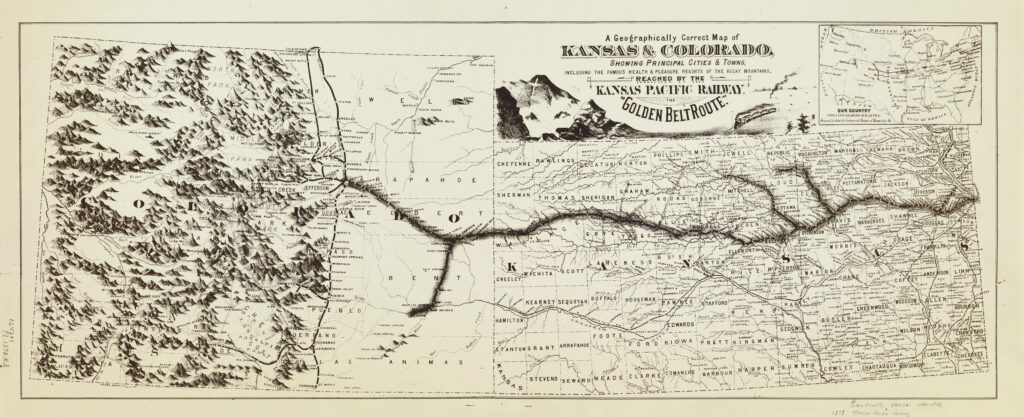
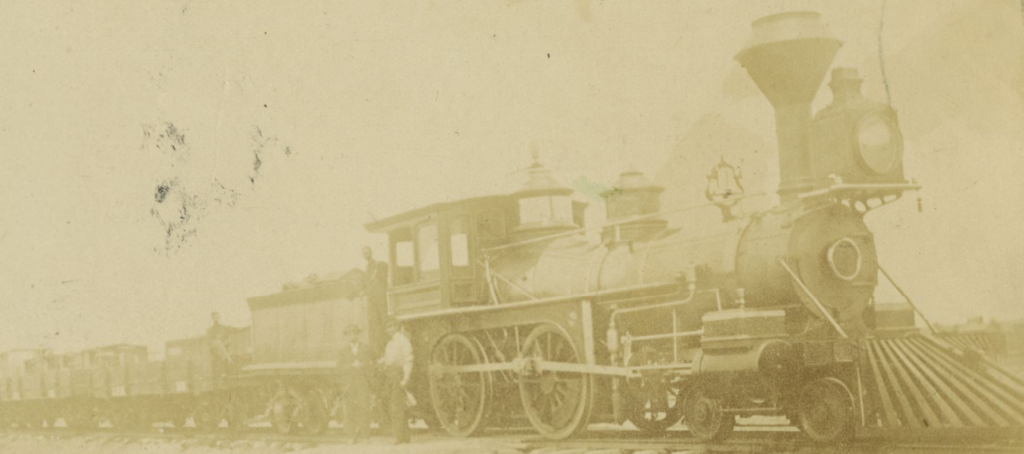
DURING
1871: To Denver, Colorado
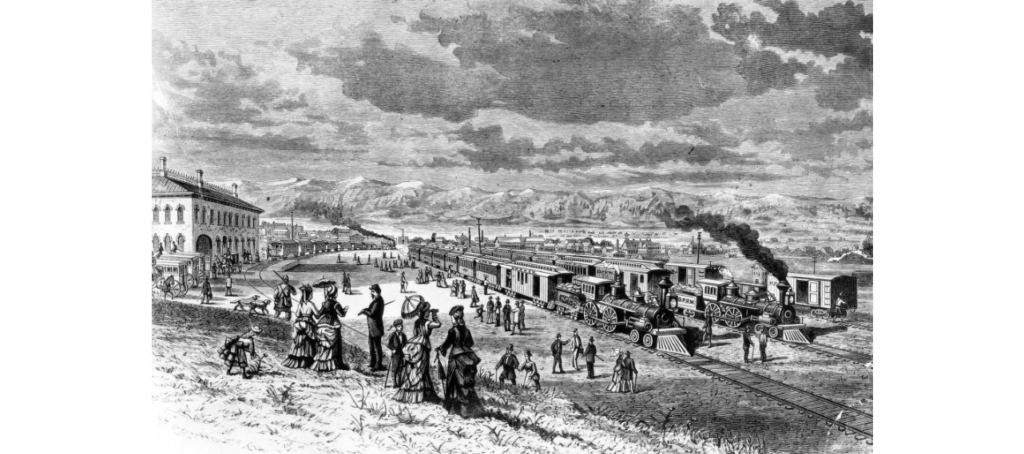
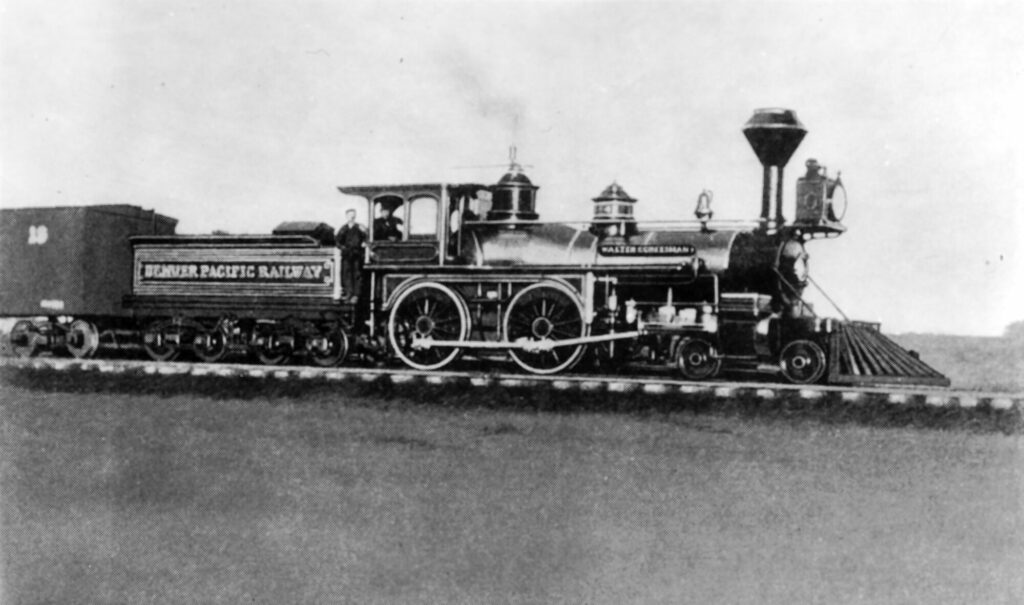
In 1870 the Kansas Pacific Railroad made it easier for people to move to the growing town of Denver. The Denver Pacific/Kansas Pacific Depot was built in 1870 and was located where Coors Field now stands (between 21st and 22nd and Wazee).
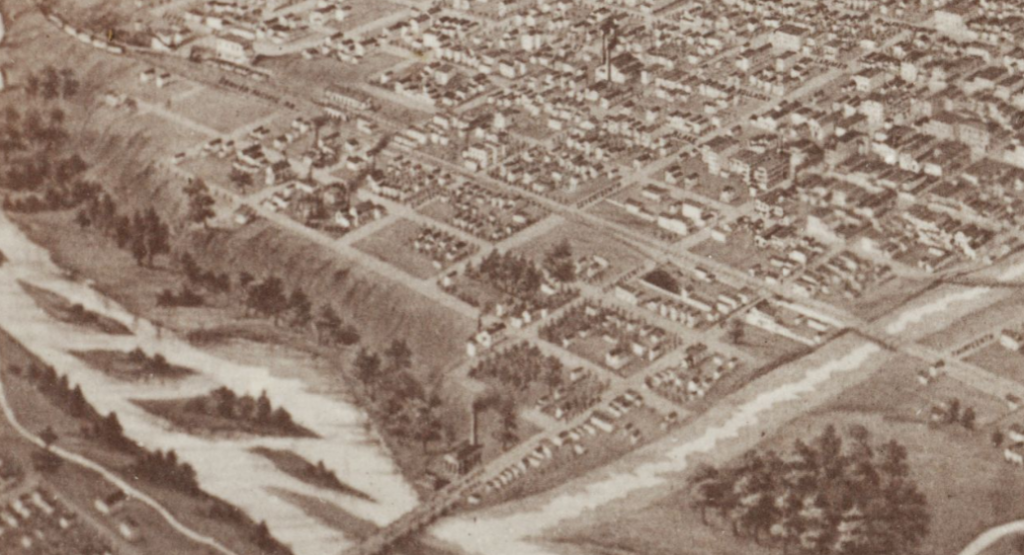
The depot was destroyed by fire in 1881. It was said that burnt remains of the depot were discovered during excavation for the Coors Field site, between first and second base.
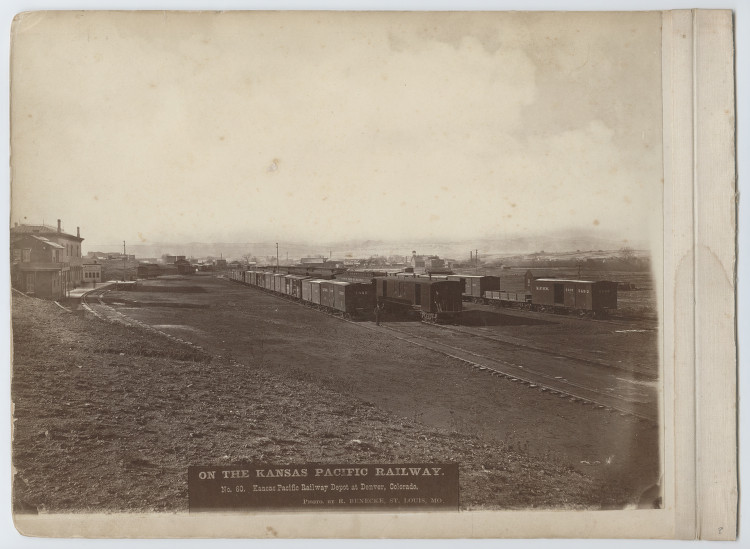
If the McCarty family and William Antrim traveled by train, this depot is likely the place they departed the train, collected their belongings and then headed over to one of the various hotels in the city…
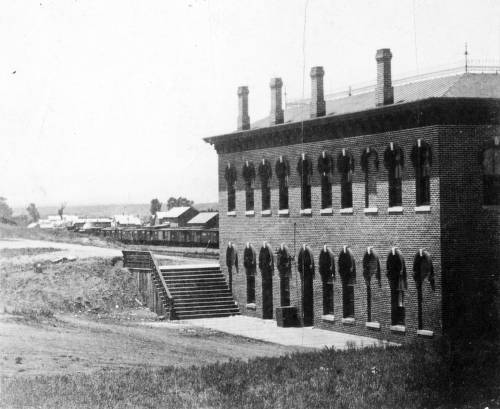
…perhaps the American House or the Broadwell House.
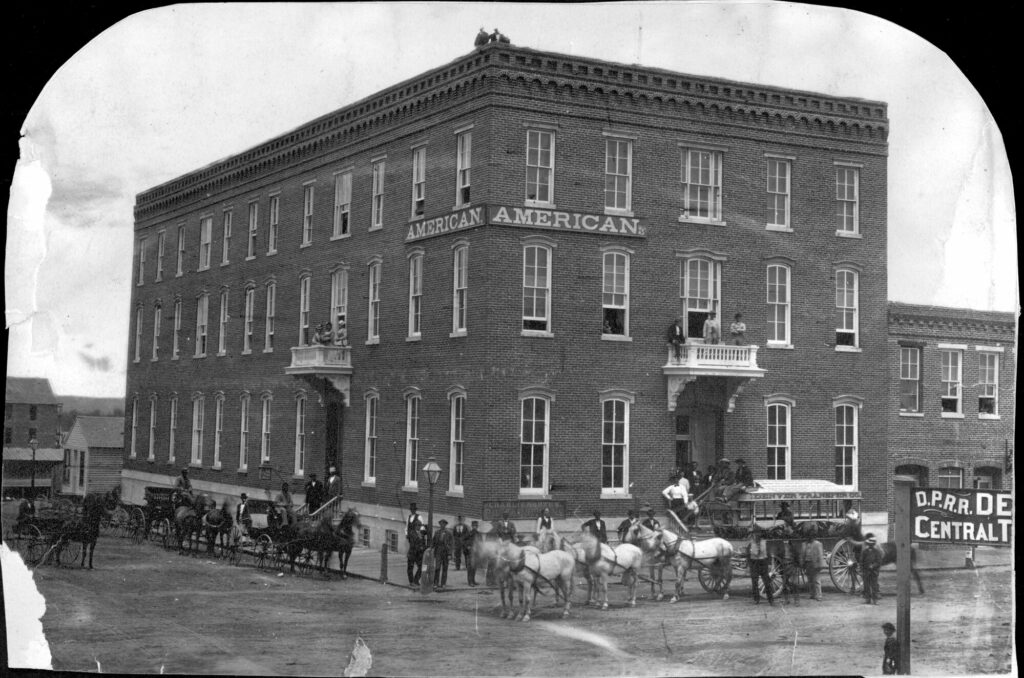
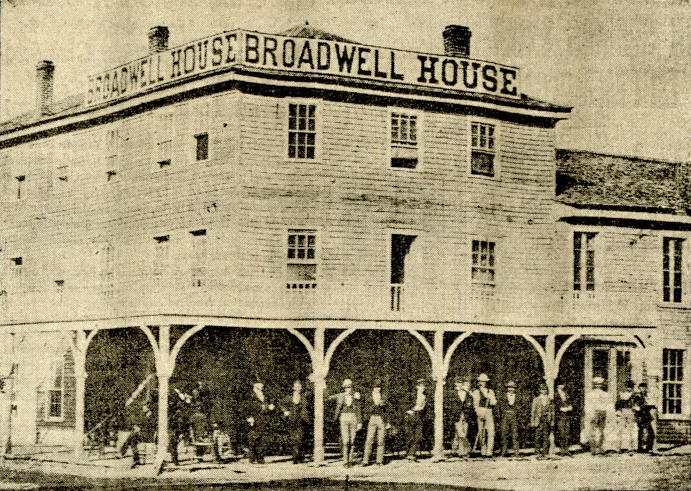
Perhaps Catherine took a job at the Denver Laundry which posted job ads throughout 1871 and was located below the American House.
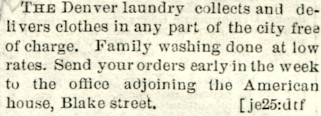
While staying in Denver, William Antrim worked as a Wells Fargo Express agent and may have also spent some time in mining camps up near Central City. Antrim and the McCarty Family stayed in Denver for a couple of years before heading southwest to Santa Fe in 1873.
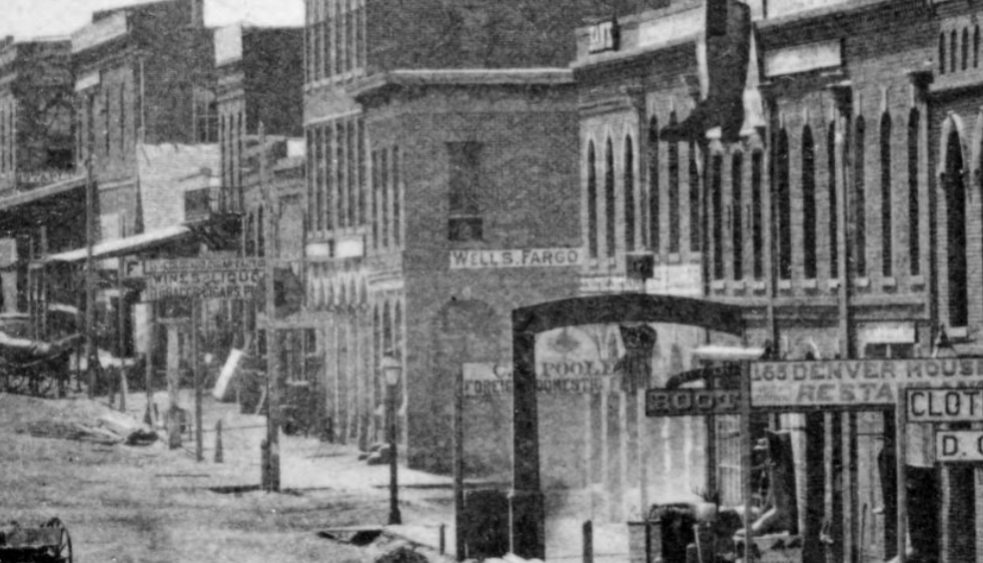
AFTER
1872-73: To Santa Fe
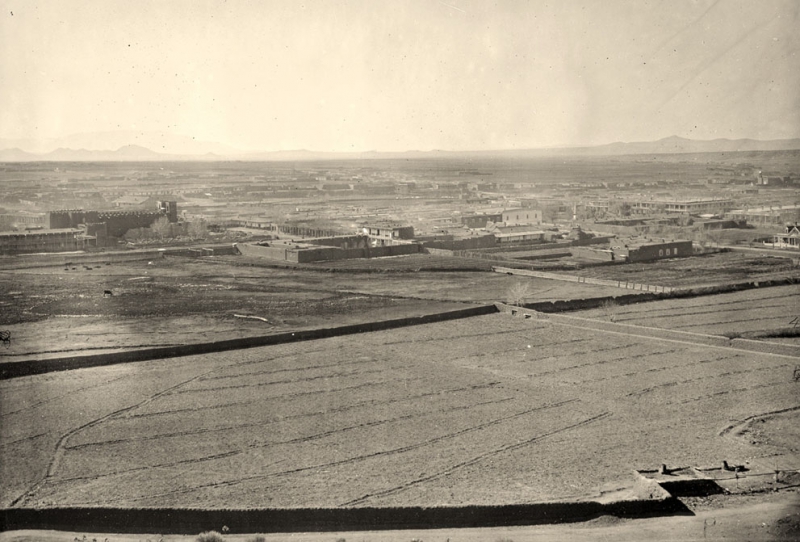
By March 1, 1873 Antrim and the McCarty family moved to Sante Fe, New Mexico (New Mexico Territory at the time) where William and Catherine were married at the First Presbyterian Church.
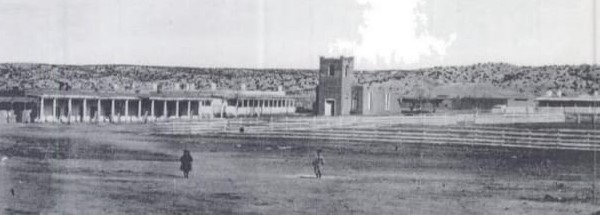
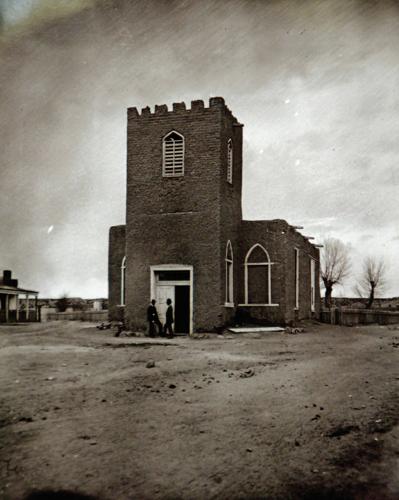
Henry and his brother were among the witnesses. Their names are written as Henry McCarty and Josie McCarty. It’s assumed Josie is short for Joseph. Henry was aged 14 and his brother Josie was aged 10.

Shortly afterward, the family moved from Santa Fe to Silver City, New Mexico.
1873-74: To Silver City
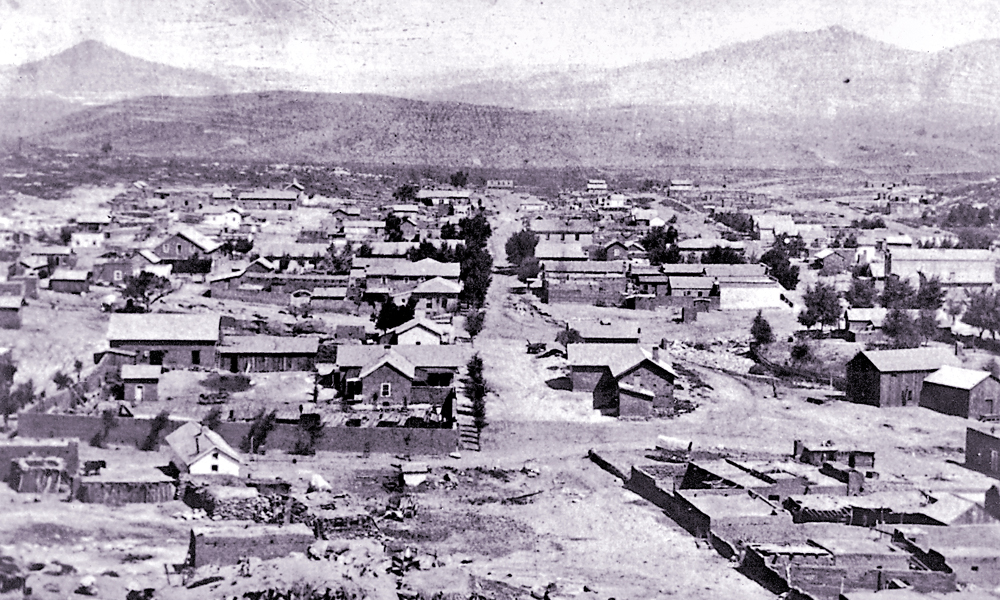
The Antrim/McCarty family lived in a small dwelling/cabin on Main Street next to the Enterprise Building.

The Enterprise building was located at the northeast corner of Main Street and Broadway, facing Broadway
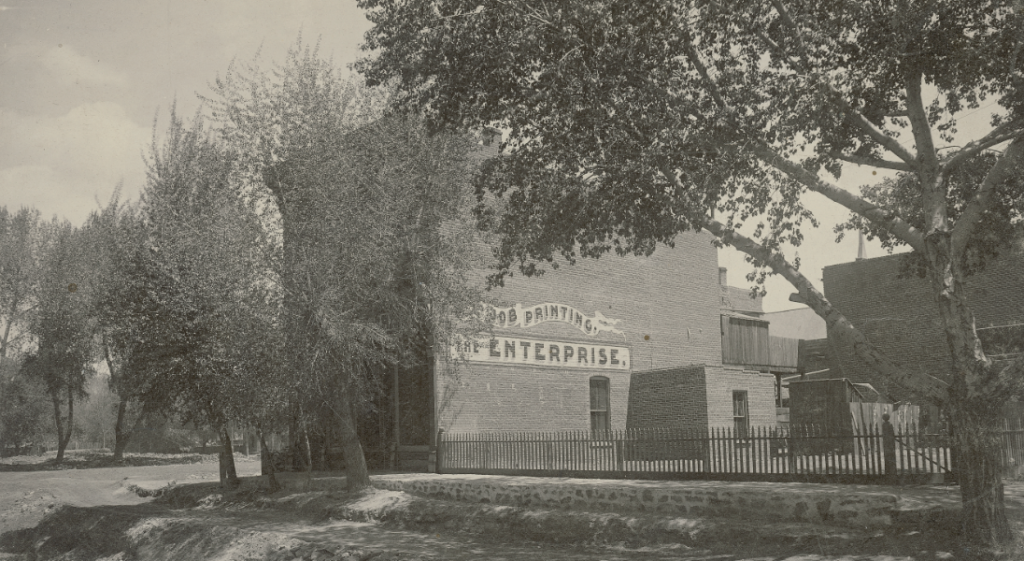
Just as she had in the past, Catherine wasted no time in settling in and getting to work. She offered laundry and cleaning services, baked goods and took in boarders. William Antrim did odd jobs and mining. One of those who boarded at Catherine’s place was Ash Upson (co-writer of Pat Garrett’s The Authentic Life of Billy the Kid) who provided a description of Catherine:
“To those who knew Billy the Kids’ mother, her courteous, kindly, and benevolent spirit was no mystery. She was evidently of Irish descent. Her husband called her Kathleen. She was about medium height, straight and graceful in form, with regular features, light blue eyes, and luxuriant golden hair. She was not a beauty, but what the world calls a fine-looking woman. She kept boarders in Silver City, and her charity and goodness of heart was proverbial. Many a hungry tenderfoot has had cause to bless the fortune which led him to her door. In all her deportment she exhibited the unmistakable characteristics of a lady. A lady by instinct and education.”
1874: Student, Henry McCarty
As a student Henry was remembered by his teacher Miss Mary Richards (later Mrs. D. C. Casey) as a “scrawny little fellow with delicate hands and an artistic nature” who was “always willing to help with the chores around the school-house,” and certainly “no more of a problem in school than any other boy growing up in a mining camp.” The schoolhouse was located near the Antrim home.
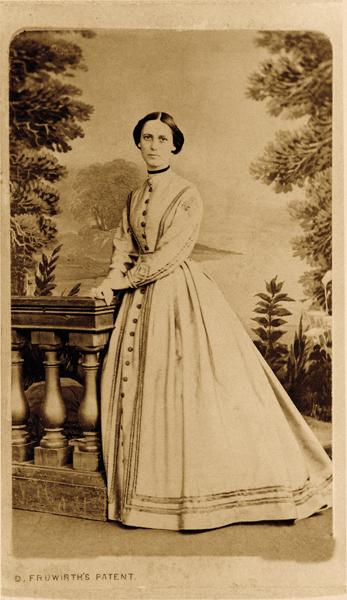

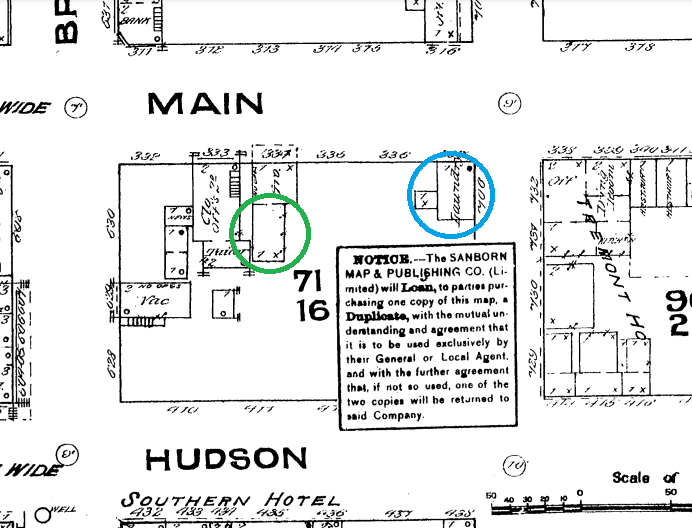
The Death of Catherine McCarty
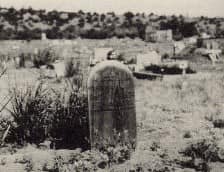
Tuberculosis was taking it’s toll on Catherine and she wasn’t getting her much needed rest. After spending most of her final days in bed with stressful coughing, fatigue and severe pain she succumbed to the disease on September 16, 1874. It’s assumed her children were by her side. A service occurred at the McCarty home followed by a burial in the Silver City Cemetery (aka Memory Lane Cemetery).
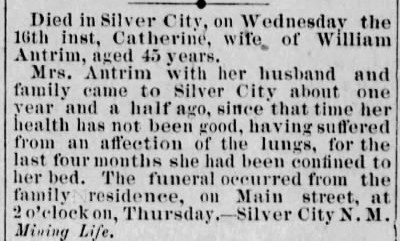
After Catherine’s death William Antrim headed for Arizona. He left Joseph in the care of the Dyer family and Henry in the care of the Truesdell family. Clara Truesdell was the mother of Chauncey Truesdell who was a friend of both Henry and Joseph. Henry stayed in a room at the Truesdell’s Star Hotel, and waited tables.

Childhood Friends Remember Henry McCarty
Anthony Conner Jr. (Childhood friend from Silver City) “We were just boys together. I never remember Billy doing anything out of the way, anymore than the rest of us. Billy got to be quite a reader. He would scarcely have his dishes washed, until he would be sprawled out somewhere reading a book. It was the same down at the butcher shop, if he was helping around there. The first thing you know, he would be reading. Finally, he took to reading the Police Gazette and dime novels.”
Louis Abraham- (Another childhood friend from Silver City) “The story of Billy the Kid killing a blacksmith in Silver City is false. Billy never was in any trouble at all; he was a good boy, maybe a little mischievous at times than the rest of us, with a little more nerve. When the boy was placed in jail and escaped he was not bad, he was just scared. If he had only waited until they let him out he would have been all right, but he was scared and ran away. He got in with a band of rustlers at Apache Tejo in the part of the county where he was made a hardened character.”
Late Fall 1874
In the Fall of 1874 Henry appeared with the other kids in a minstrel show to raise money for the school. In mid-December, Mary Richards held an open house and staged a party for the children, all of whom, according to Mining Life Editor Owen Scott, excelled at recitation.
In the summer of 1875, Henry was boarding at the home of Mrs. Sarah Brown, and met a young stonemason and thief named George Schaefer who’s nickname was “Sombrero Jack.” On September 4, 1875, Schaefer broke into laundryman Charlie Sun’s house and stole about $200 worth of goods. Henry was given some of the items Schaefer had stolen and hid them in his room. Mrs. Brown found the items and informed Sheriff Harvey Whitehill, who arrested Henry.
Henry McCarty was arrested and committed to jail to await the action of the grand jury on charges of stealing clothes from Charlie Sun and Sam Chung. It is believed that Henry was simply the tool of Sombrero Jack who did the actual stealing while Henry did the hiding. Jack has skipped out. – Grant County Herald, September 26,1875.
In 1902 Sheriff Harvey Whitehill told his side of this story.

After his arrest and escape Henry fled to Clifton, Arizona where his stepfather was staying.

Henry stayed in Arizona where, it has been written, he earned the nickname “Kid” and got a job as a cook at the Hotel de Luna. It was at this time that Henry met a horse thief named John Mackie who taught him how to make money stealing horses.
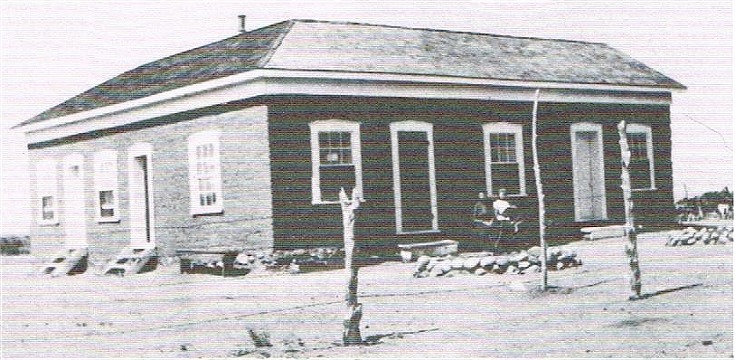
Henry and Mackie were arrested on March 25, 1877 and put in the guardhouse at Fort Grant. In the evening Henry escaped.
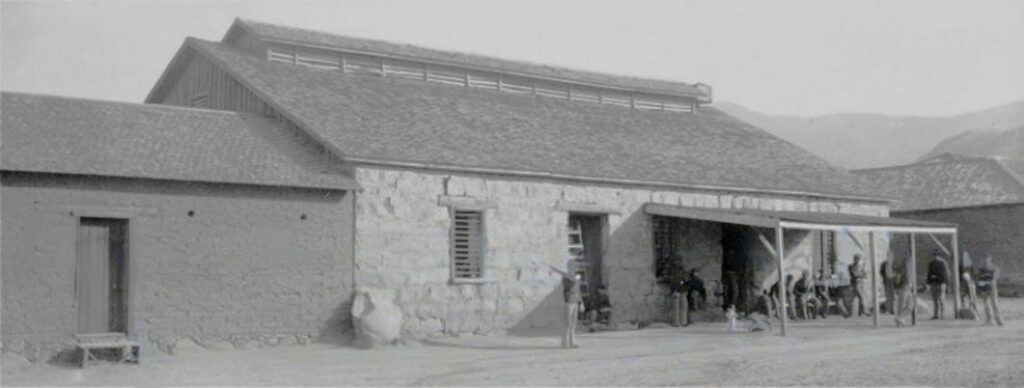
Henry continued to find work in the Fort Grant and Fort Thomas areas.
H.F. Smith- (Ranch foreman) “He said he was seventeen, though he didn’t look to be fourteen. I gave him a job helping around camp. He hadn’t worked very long until he wanted his money. I asked him if he was going to quit. He said, ‘No, I want to buy some things.’ I asked him how much he wanted and tried to get him to take $10 for I thought that was enough for him to spend, but he hesitated and asked for $40. I gave it to him. He went down to the post trader and bought himself a whole outfit: six-shooter, belt, scabbard, and cartridges.”
August, 1877: Henry McCarty Shoots Frank Cahill
On August 17, 1877 Henry was hanging out in a Bonita cantina owned by George Atkins located near Fort Grant. In the cantina Henry was being bullied by Frank “Windy” Cahill. The two began fighting and Henry pulled his gun and shot Cahill in his side. Before he died on August 19th, Cahill admitted that he was at fault in the incident. His final words were taken by Notary Public Miles Wood and printed in the Arizona Weekly Star on August 23.
I, Frank Cahill, being convinced that I am about to die, do make the following as my final statement. My name is Frank P. Cahill. I was born in the county and town of Galway, Ireland. Yesterday, August 17th, 1877, I had some trouble with Henry Antrim, otherwise known as Kid, during which he shot me. I had called him a name and he called me a name. We then took hold of each other. I did not hit him, I think. Saw him go for his pistol and tried to get hold of it, but could not and he shot me in the belly. I have a sister named Margaret Flannigan living at East Cambridge, Mass., and another named Kate Conden, living in San Francisco.
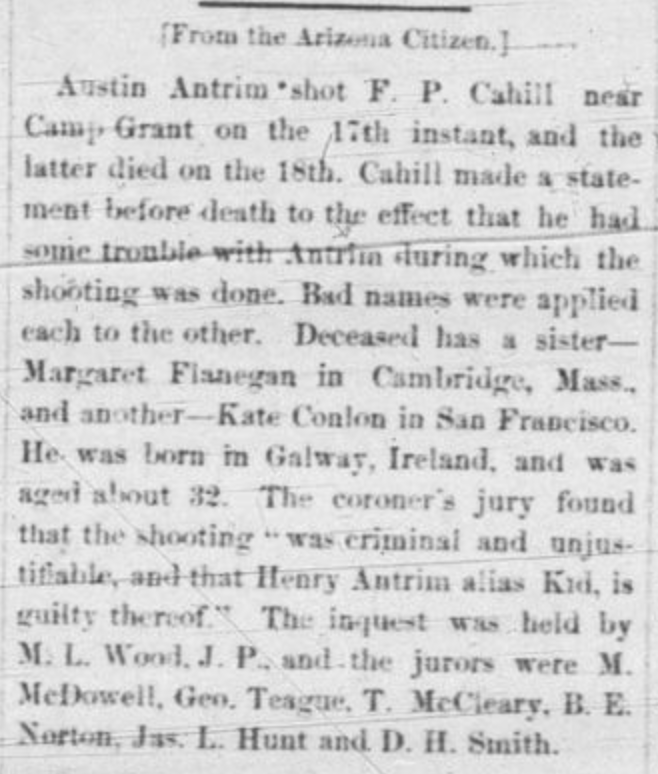
Henry fled Arizona after the shooting but returned a few days later and was apprehended by Miles Wood, who was also the local Justice of the Peace. He was detained and held in the Fort Grant guardhouse but escaped before law enforcement arrived.
Henry made his way back to Silver City, New Mexico where he met up with Jesse Evans and his group of cattle rustlers known as “The Boys.”
Lincoln County
The Boys made their way east to Lincoln County, New Mexico and found themselves choosing sides in the Lincoln County War. Henry sided with local merchant John Tunstall, while Evans sided with merchant Lawrence Murphy. Tunstall was killed on February 18, 1878 during a confrontation with Lincoln County Sheriff William Brady and his posse after Brady, a Murphy sympathizer, attempted to take Tunstall’s cattle.
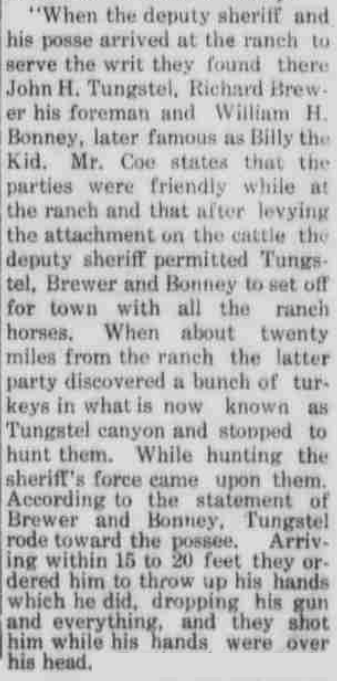
The Regulators, which included Henry, were formed to avenge Tunstall’s death.


Following the Lincoln County War New Mexico Governor Lou Wallace was seeking to restore order and offered a pardon to Henry in exchange for his testimony against those involved in the murder of Houston Chapman.
On March 13, 1879 Henry wrote to Governor Lew Wallace for the first time:
To his Excellency the Governor General Lew Wallace,
Dear Sir, I have heard that you will give one thousand dollars for my body which as I can understand it means alive as a witness. I know it is as a witness against those that murdered Mr. Chapman. if it was so as that I could appear at Court I could give the desired information, but I have indictments against me for things that happened in the late Lincoln County War and am afraid to give up because my Enemies would Kill me. the day Mr. Chapman was murdered I was in Lincoln, at the request of good Citizens to meet Mr. J.J. Dolan to meet as Friends, so as to be able to lay aside our arms and go to Work. I was present when Mr. Chapman was murdered and know who did it and if it were not for those indictments I would have made it clear before now. if it is in your power to Annully those indictments I hope you will do so so as to give me a chance to explain. Please send me an awnser telling me what you can do You can send awnser by bearer I have no wish to fight any more indeed I have not raised an arm since your proclamation. As to my character I refer to any of the citizens, for the majority of them are my friends and have been helping me all they could. I am called Kid Antrim but Antrim is my stepfathers name.
Waiting for an awnser I remain your Obedeint Servant
W.H. Bonney
Governor Lew Wallace’s reply to Billy the Kid’s above letter:
Lincoln, March 15, 1879
W.H. Bonney,
Come to the house of Squire Wilson (not the lawyer) at nine o’clock next Monday night alone. I don’t mean his office, but his residence. Follow along the foot of the mountain south of the town, come in on that side, and knock on the east door. I have authority to exempt you from prosecution, if you will testify to what you say you know.
The object of the meeting at Squire Wilson’s is to arrange the matter in a way to make your life safe. To do that the utmost secrecy is to be used. So come along. Don’t tell anybody -not a living soul- where you are coming or the object. If you could trust Jesse Evans, you can trust me.
-Lew Wallace
After Henry had met with the governor and agreed to submit to a staged arrest, he wrote a note to Wallace regarding how and when he’d surrender. He was also concerned that when he was taken prisoner, Jessie Evans and Billy Campbell might try to kill him. He then recommended how they could be captured:
San Patricio, Lincoln County Thursday, March 20, 1879
General Lew Wallace:
Sir, I will keep the appointment I made but be sure and have men come that you can depend on I am not afraid to die like a man fighting but I would not like to be killed like a dog unarmed. Tell Kimbal to let his men be placed around the house and for him to come in alone; and he can arrest us. all I am afraid of is that in the Fort we might be poisoned or killed through a window at night, but you can arrange that all right. Tell the Commanding Officer to Watch Lt. Goodwin he would not hesitate to so anything there Will be danger on the road of Somebody Waylaying us to kill us on the road to the Fort. You will never catch those fellows on the road Watch Fritzes. Captain Bacas ranch and the Brewery they will either go up Seven Rivers or Jicarillo Mountains they Will stay around close until the scouting come in give a spy a pair of glasses and let him get on the mountain back of Fritz’s and watch and if they are there, there will be provisions carried to them. It is not my place to advise you but I am anxious to have them caught and perhaps know how men hid from soldiers better than you. Please excuse me for having so much to say and still remain,
Yours Truly,
William H. Bonney
P.S. I had change my mind. Send Kimbal to Gutierrz just below San Patricio one mile, because Sanger and Ballard are or were great friends of Camuls (Campbell’s). Ballard told me yesterday to leave for you were doing everything to catch me. It was a blind to get me to leave. Tell Kimbal not to come before 3 o’clock for I may not be there before.
May 25, 1879, Henry McCarty’s Testimony Regarding Death of Alexander McSween (July 19, 1878)
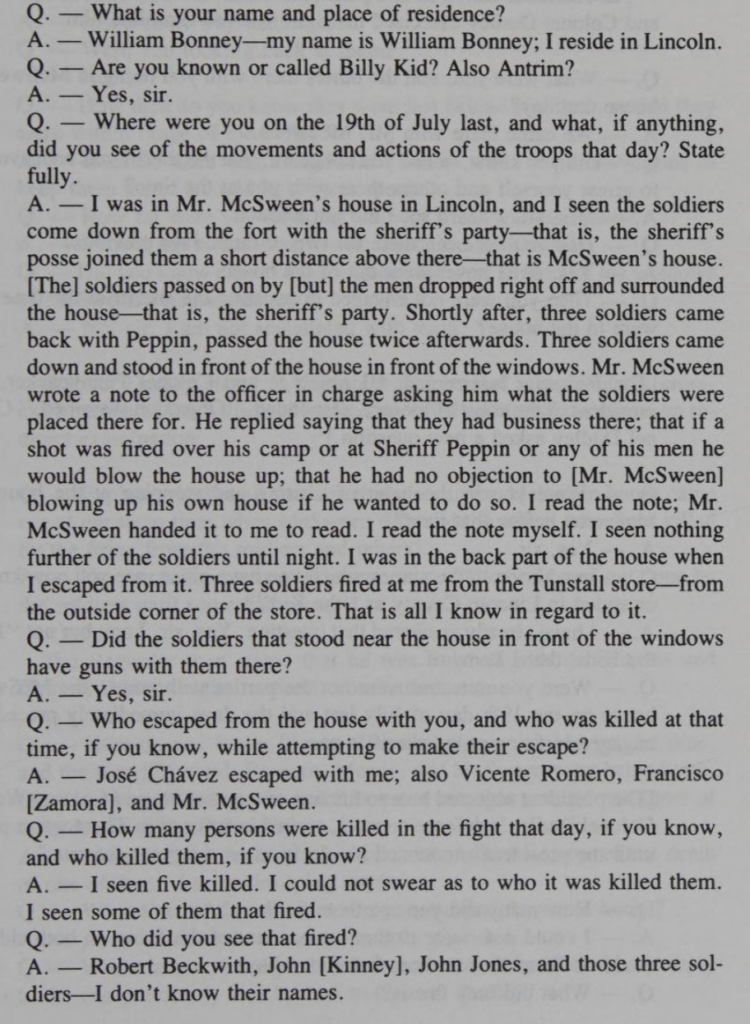
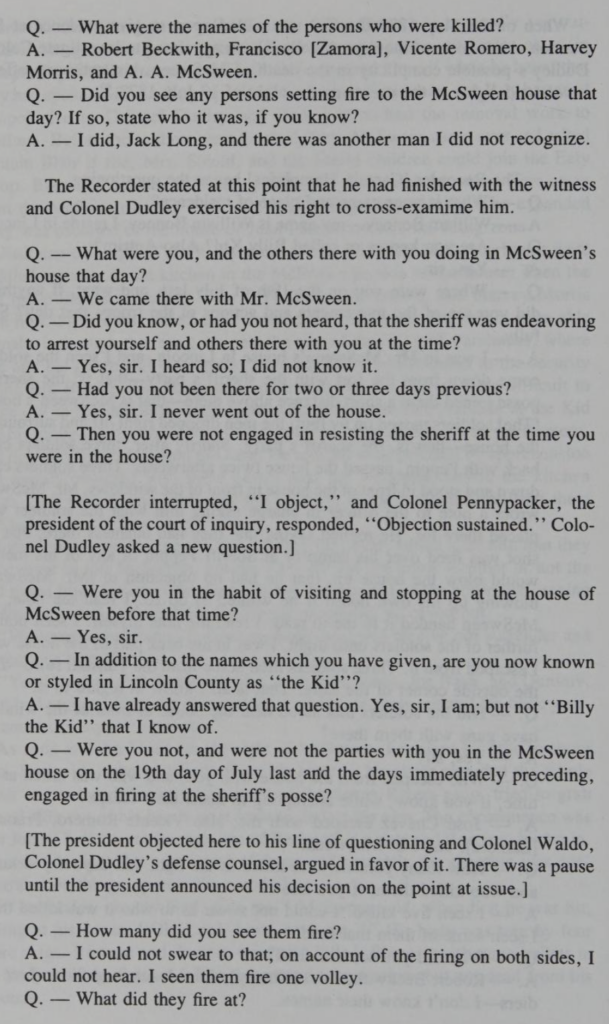
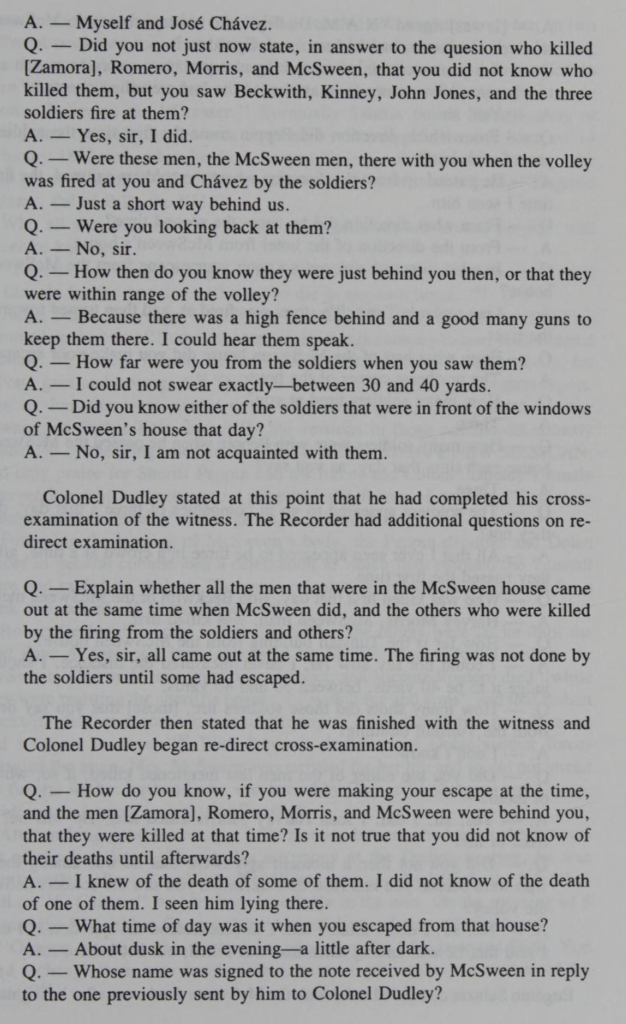
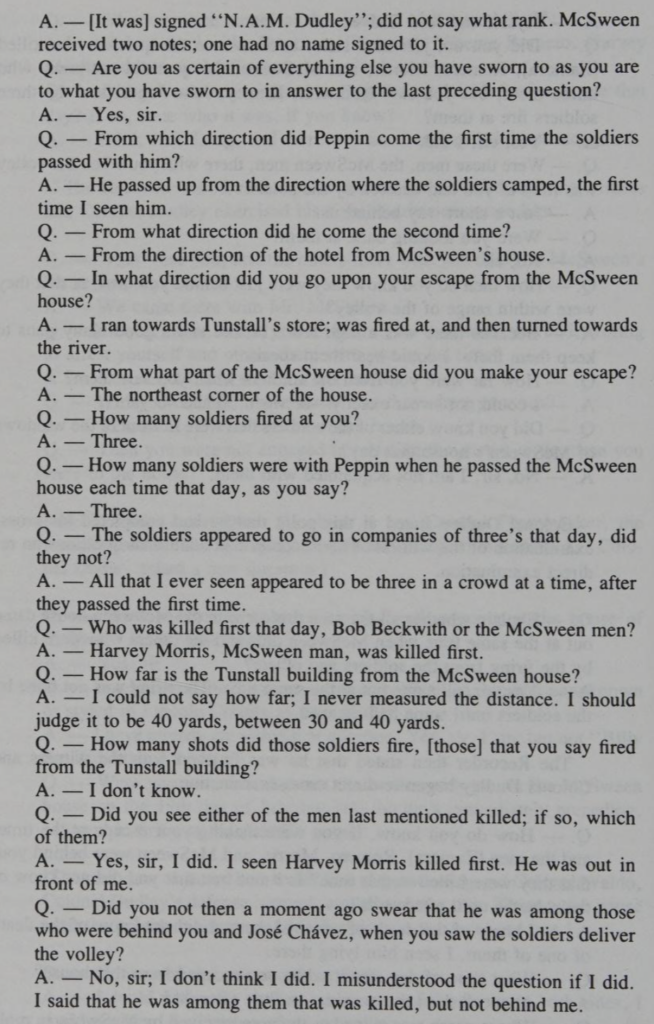
In the Spring of 1879 Henry grew impatient waiting on a pardon that was likely never going to come and escaped from custody.
Billy the Kid
Although Henry mentions it in his May 25, 1879 testimony, it has been suggested that the first known published/public use of the name “Billy the Kid” was in December 1880, in the Las Vegas Gazette.
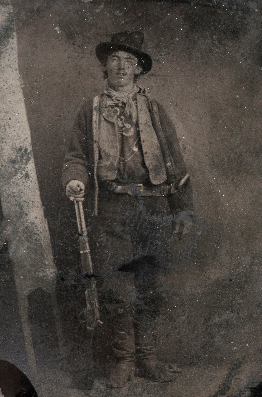

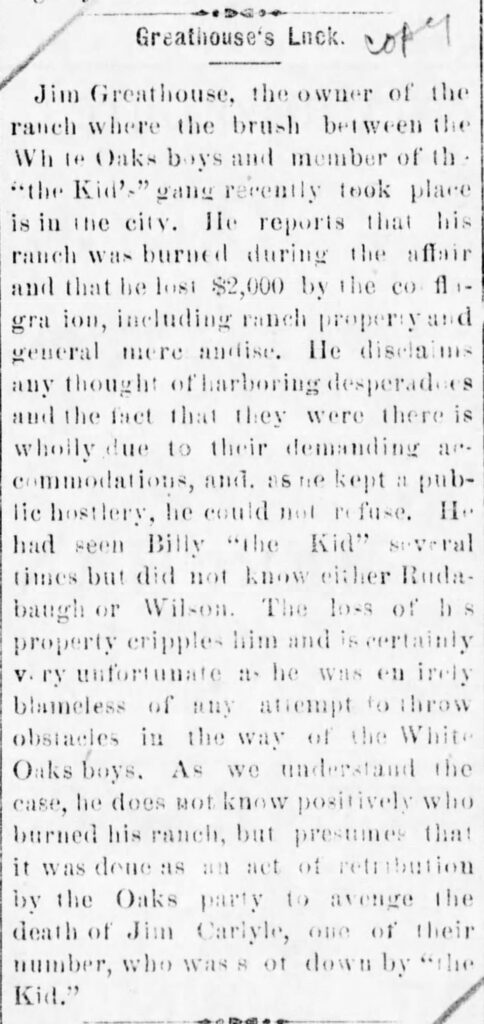
In December of 1880 Henry wrote to Governor Wallace about the accusations in the Las Vegas Gazette concerning his rustling activities and the killing of Deputy James Carlyle:
Fort Sumner, Dec 12, 1880
Gov. Lew Wallace
Dear Sir,
I noticed in the Las Vegas Gazette a piece which stated that Billy “the” Kid, the name by which I am known in the County was the Captain of a Band of Outlaws who hold Forth at the Portales. There is no such Organization in existence. So the Gentlemen must have drawn very heavily on his imagination. My business at the White Oaks at the time I was waylaid and my horse killed was to see Judge Leonard who has my case in hand, he had written to me to come up, that he thought he could get Everything Straighend up. I did not find him at the Oaks I should have gone to Lincoln if I had met with no accident. After mine and Billie Wilsons horses were Killed we both made our way to a Station, forty miles from the Oaks kept by Mr. Greathouse. When I got up next morning The house was Surrounded by an outfit led by one Carlyle Who came into the house and Demanded a surrender. I asked for their Papers and they had none. So I concluded it Accounted to nothing more then a mob and told Carlyle that he would have to stay in the house and lead the way out that night. Soon after a note was brought in stating that if Carlyle did not come out inside of five minutes they would kill the Station Keeper (Greathouse) who had left the house and was with them. in a short time a shot was fired on the outside and Carlyle thinking Greathouse was Killed jumped through the window. breaking the sash as he went and was killed by his own Party they thinking it was me trying to make my escape. the party then withdrew.
They returned the next day and burned an old man named Spencer’s house and Greathouses also. I made my way to the Place afoot and During my absence Deputy Sheriff Garrett Acting under Chisums orders went to the Portales and found nothing. on his way back he went to Mr. Yerbys ranch and took a pair of mules of mine which I had left with Mr. Bowdre who is in charge of Mr. Yerbys Cattle. he (Garrett) Claimed that they were stolen and Even if they were not he had a right to confiscate any Outlaws property. I have been at Sumner Since I left Lincoln making my living Gambling the mules were bought by me the truth of which I can prove by the best citizens aroud Sumner. J.S. Chisum is the man who got me into Trouble and was benefited Thousands by it and is now doing all he can against me. There is no Doubt but what there is a great deal of Stealing going on in the Territory and a great deal of the Property is taken across the Plains as it is a good outlet. but as far as my being at the head of a Band there is nothing of it. Several Instances I have recovered Stolen Property when there was no chance to get an Officer to do it. One Instance for Hugo Zuber Post office Puerto de Luna, another for Pablo Analla Same Place. if some impartial Party were to investigate this matter they would find it far Different from the impression put out by Chisum and his tools.
Yours Respect-
William Bonney
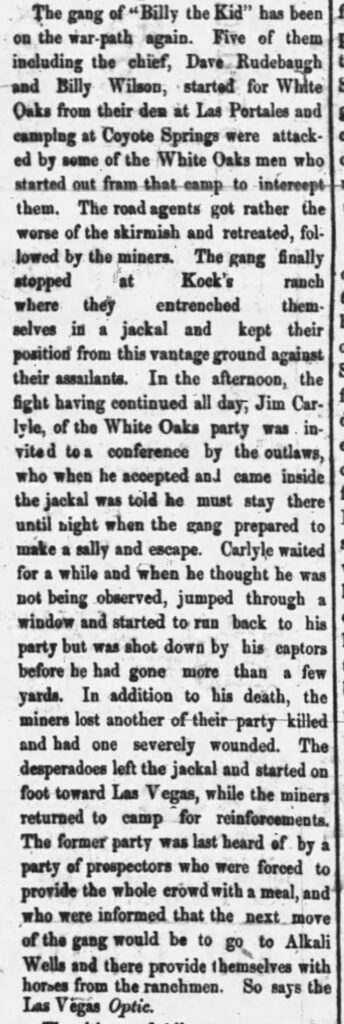
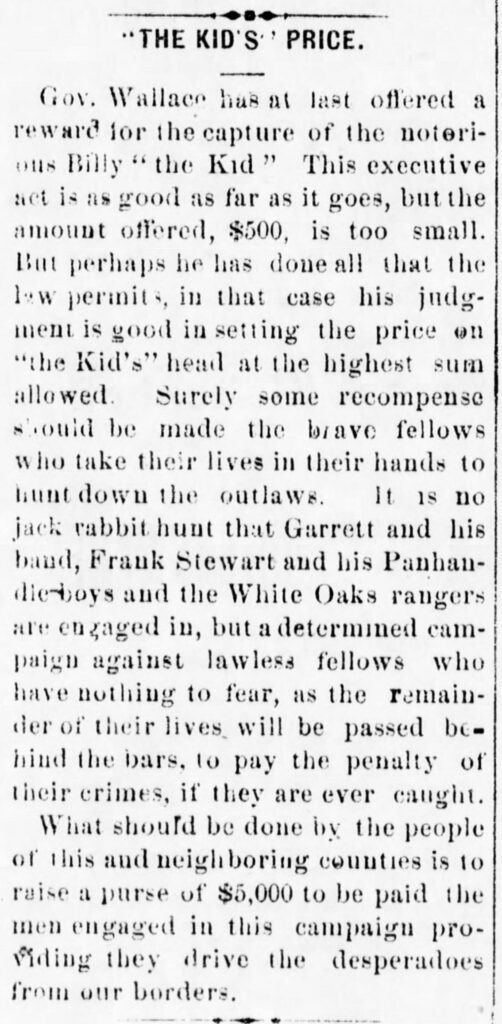


December 27, 1880: Interview with Henry McCarty by The Las Vegas Gazette at the train depot shortly after his capture.
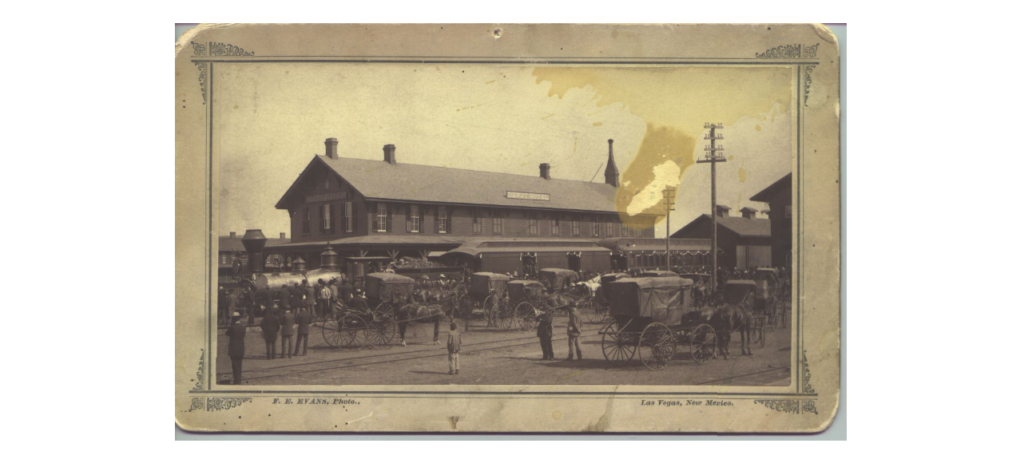
I don’t blame you for writing of me as you have. You had to believe other stories but then I don’t know, as anyone would believe anything good of me anyway. I wasn’t the leader of my gang, I was for Billy all the time. About that Portales business, I owned the ranch with Charlie Bowdre. I took it up and was holding it because I knew that sometime a stage would run by there and I wanted to keep it for a station. But I found that there were certain men who wouldn’t let me live in the country and so I was going to leave. We had all our grub in the house when they took us in and we were going to a place about six miles away in the morning to cook it and then light out.
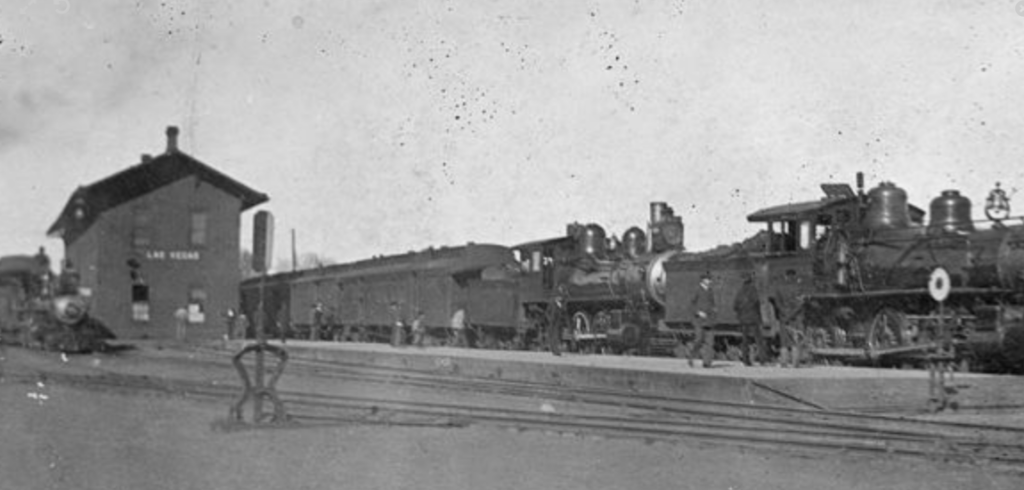
I haven’t stolen any stock. I made my living by gambling but that was the only way I could live. They wouldn’t let me settle down; if they had I wouldn’t be here today. Holding up his left hand with the bracelet Henry continued, John Chisum got me into all this trouble and then wouldn’t let me get out. I went up to Lincoln to stand my trial on the warrant that was out for me, but the Territory took a change of venue to Dona Ana and I knew that I had no show, and so I skinned out.
When I went up to White Oaks the last time, I went there to consult with a lawyer, who had sent for me to come up. But I knew I couldn’t stay there either.
The conversation then drifted to the question of the final round up of the party. If it hadn’t been for the dead horse in the doorway I wouldn’t be here today. I would have ridden out on my bay mare and taken my chances of escaping. But I couldn’t ride over that [the dead horse] for she would have jumped back and I would have got it in the head. We could have stayed in the house but there wouldn’t have been anything gained by that for they would have starved us out. I thought it was better to come out and get a good square meal-don’t you?

While confined in the Santa Fe jail, Henry and his cell mates got interviewed by the Las Vegas Gazette. Henry wrote letters to the governor during that time as well.
Santa Fe
Jan 1st 1881
Gov. Lew Wallace
Dear Sir
I would like to see you for a few moments if you can spare time.
Yours Respect-
W.H. Bonney
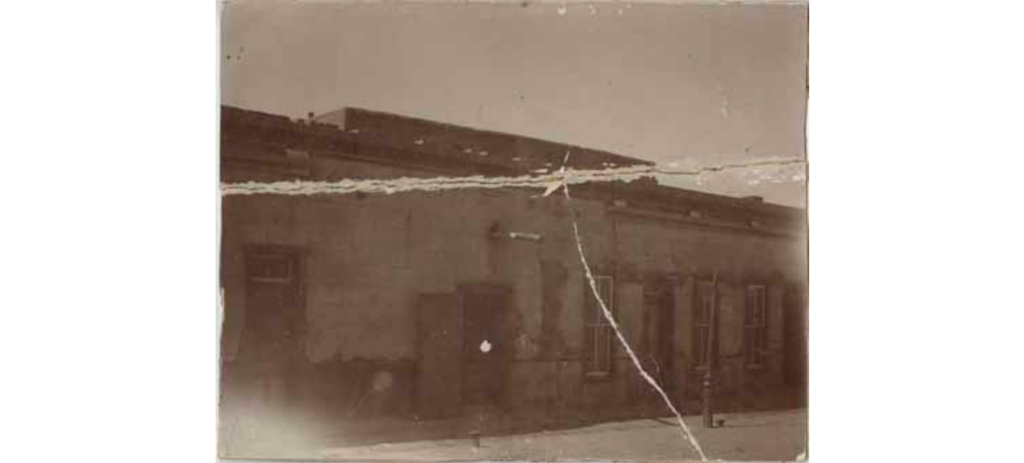
On January 21, 1881 Henry was interviewed in the Santa Fe jail by the Las Vegas Gazette.
“A few days ago, a representative of the GAZETTE paid a visit to Billy Bonney, ‘the Kid,’ Dave Rudabaugh and Billy Wilson in the Santa Fe jail. They were all heavily shackled and were lying about on their cots, but rose as the heavy iron door swung back on its hinges. After speaking with them all, the GAZETTE man made some remarks on the tidiness of their cell. Oh; this is a palace as compared with that place they put fellows in in Vegas, said Billy, we’ve been scrubbing up today,” he continued, glancing around and contemplating their work. The men all appeared to be in good humor and the talk passing from one topic to another, the Kid said, I’m getting up a terrible reputation. Allusion being made to the horrible picture of him in the Police News that has been the laughing stock of the town, Billy made all manner of fun of it.
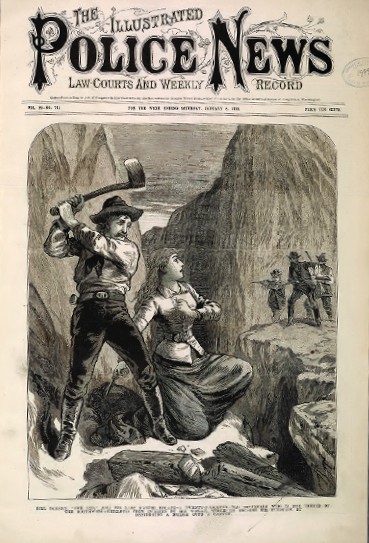
I got hold of the paper first when it was brought in,” he said, ‘but I was ashamed to let the other fellows see it. Wasn’t it savage, though? he enquired.
We gave our unbiased opinion that we thought it was, and were not a little amused at the way the subject of the frontispiece of the super-sensational paper ran on about it.
I never had any beautiful Mexican girl with me. It was as much as I could do to take care of myself, was his disposition of the picture. But, his eyes flashing as he spoke, she was game though. See the way she stood off the crowd after me,” said the admirer of personal courage.
“I say boss,” sang out a fellow lying near the stove. “Ain’t you got any influence with the U.S. government to get it to give a man a hat,” said the fellow swung over his head a paper cap, such as dull scholars in backwoods towns “down east” wear as a symbol of dullness.
Have you any other hat?
“No, nor I haint had any for sixteen months, ever since I was put in here.”
“He’s had hard luck, that fellow has,” said one of the boys. “He’s been in here for sixteen months waiting trial for something that ‘his nibs’ did” pointing to Dave Rudabaugh who was lying near the fellow with the paper cap.
“Yes, they’ve kept him in for what I did,” attested Rudabaugh.
We were considerably interested in knowing who this long-time-incarcerated man might be, and found on inquiry that it was “B.S.” Jack well known in Vegas and who was accused of robbing the coach near this city.
“None of the men they’ve got in jail had anything to do with robbing the stage or the train,” said Rudabaugh. “I’m in for it now, and might as well tell the truth. The Stokes boys are perfectly innocent, and so are all the men who were mistreated of being mixed up in both affairs. I don’t propose to tell who did to either, but they haven’t got ‘any of the men but me.” There was a general conversation concerning the Stokes boys and all the boys said it was a shame that they were ever arrested.
“B.S.” Jack told his story. He said that he was “broke” and was just tied up with rheumatism. “I couldn’t have walked as far as where the coach was robbed and back to my room again,” he said. “That’s the way with some of us poor devils who haven’t a friend,” said he, “they just pounce down on us because they think no one would believe a word we would say.” He was in a good humor like the rest, but he has had nearly a year and a half to brood over his misfortune, and was at times somewhat sour.
“They’ve got another innocent man in jail in Vegas,” said Rudabaugh. When asked who that might be, he said, “Webb; he ain’t any more guilty of killing Kelliher than you are.” The “imported editor” came to the conclusion that it his residence in Vegas in March were made a test of Webb’s innocence that man was safe.
“I saw the whole affair and if my word is worth anything, I say that; that man didn’t do the killing.” He stoutly adhered to this and said that if he only had a chance to testify he would say so.
Well, Billy, what do you think of your notoriety? we asked of “the Kid.”
“I don’t see any money in it. Everything that has been done in that country is laid to me,” and he really seemed ashamed of the reputation that he had gained.
If you got out, you could get up a show like Buffalo Bill; you have had advertising enough.
“If—” was his only comment.
The boys expressed themselves as having nothing to complain of regarding their keeping and keepers and said that Sheriff Martinez and everyone connected with the jail treated them “white.” As the GAZETTE man turned to go, B.S. impressed on his mind his need of a hat and coat and the doors clanged on the prisoners.
Santa Fe Jail New Mex
March 2d 1881
Gov. Lew Wallace
Dear Sir,
I wish you would come down to the jail and see me. it will be to your interest to come and see me. I have some letters which date back two years, and there are Parties who are very anxious to get them but I shall not dispose of them until I see you. that is if you will come immediately.
Yours Respect-
Wm H. Bonney

Santa Fe in Jail
March 4, 1881
Gov. Lew Wallace
Dear Sir
I wrote You a little note the day before yesterday but have received no answer. I Expect you have forgotten what you promised me, this Month two years ago, but I have not and I think You had ought to have come and seen me as I requested you to. I have done everything that I promised you I would and You have done nothing that You promised me.
I think when You think the matter over You will come down and See me, and I can then Explain Everything to You.
Judge Leonard Passed through here on his way East, in January and promised to come and See me on his way back, but he did not fulfill his Promise. It looks to me like I am getting left in the Cold. I am not treated right by Sherman, he lets Every Stranger that comes to see me through Curiosity in to see me, but will not let a Single one of my friends in, Not even an Attorney.
I guess they mean to Send me up without giving me any Show but they will have a nice time doing it. I am not intirely without friends.
I shall Expect to See you some time today.
Patiently Waiting
I am truly Yours Respect-
Wm. H. Bonney
Santa Fe New Mexico
March 27th /81
Gov. Lew Wallace
Dear Sir
For the last time I ask, Will you keep your promise. I start below tomorrow send answer by bearer.
Yours Respt-
W.Bonney

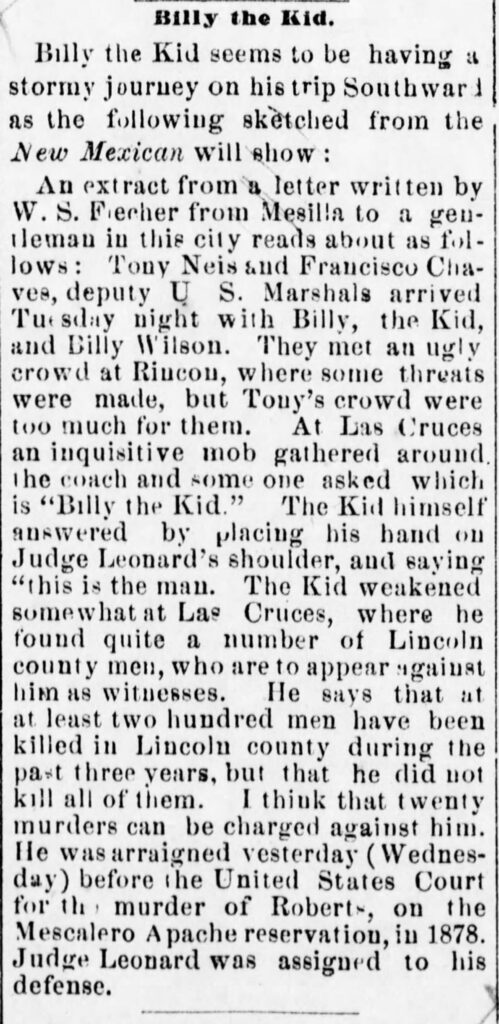
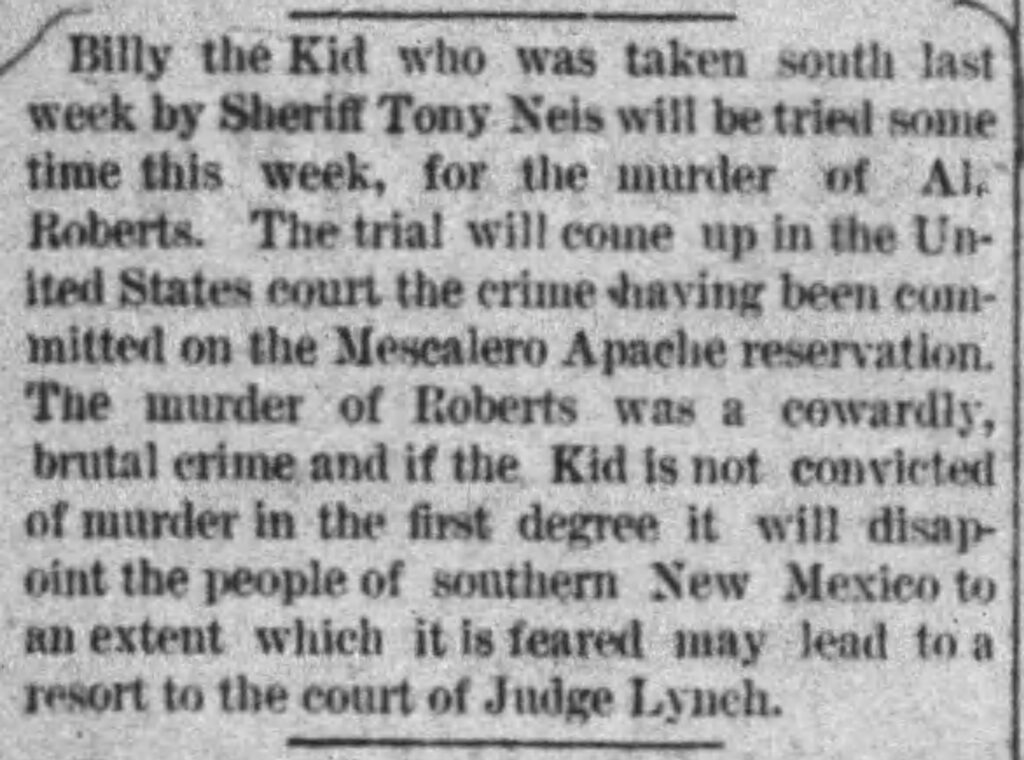
The federal trial in Las Cruces accusing Henry for the killing of “Buckshot” Roberts was thrown out because it took place on private, not public land. Another trial commenced for the killing of Sheriff Brady on April 8th.
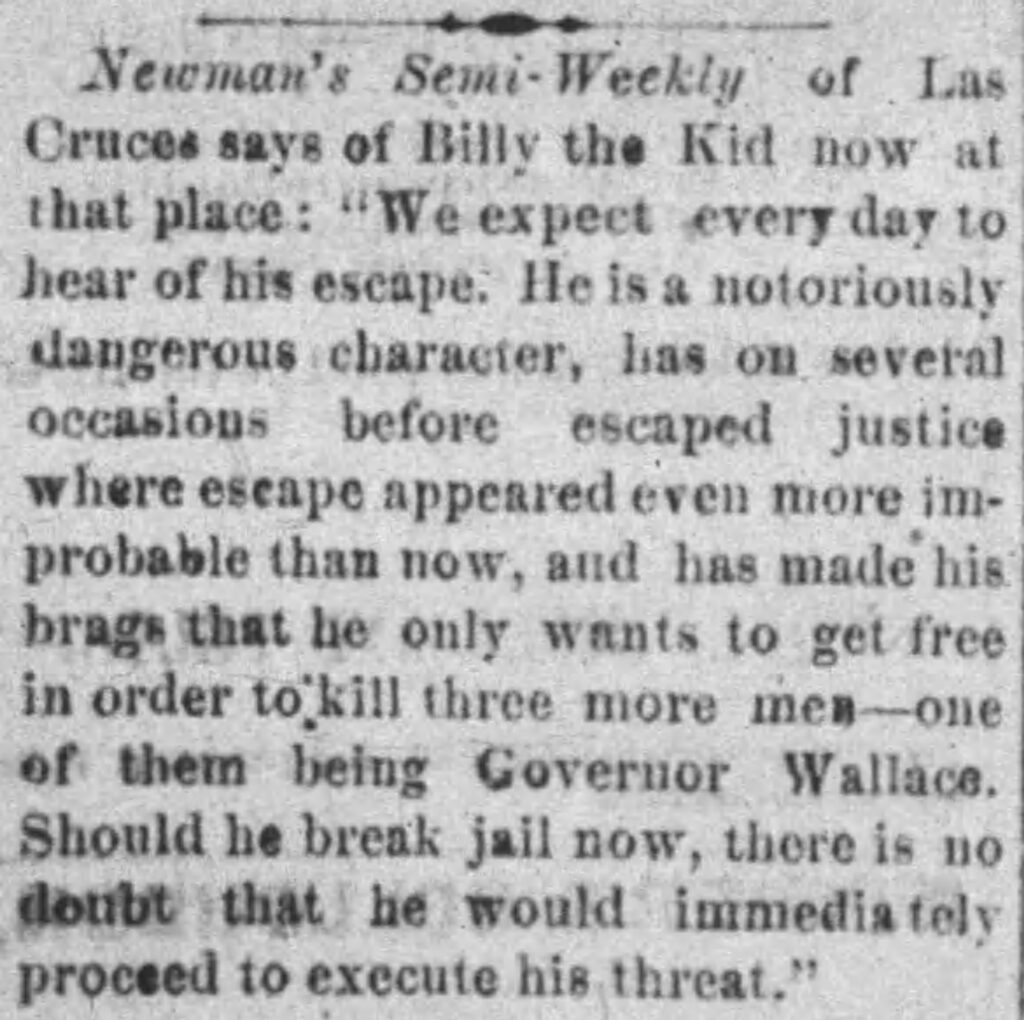
The judge presiding, Judge Bristol was the presiding judge and Henry’s appointed defense attorneys were John D. Bail and Albert Fountain. On April 13th the jury found Henry guilty. The judge sentenced Henry to death by hanging, scheduled for May 13, 1881 in Lincoln, New Mexico.
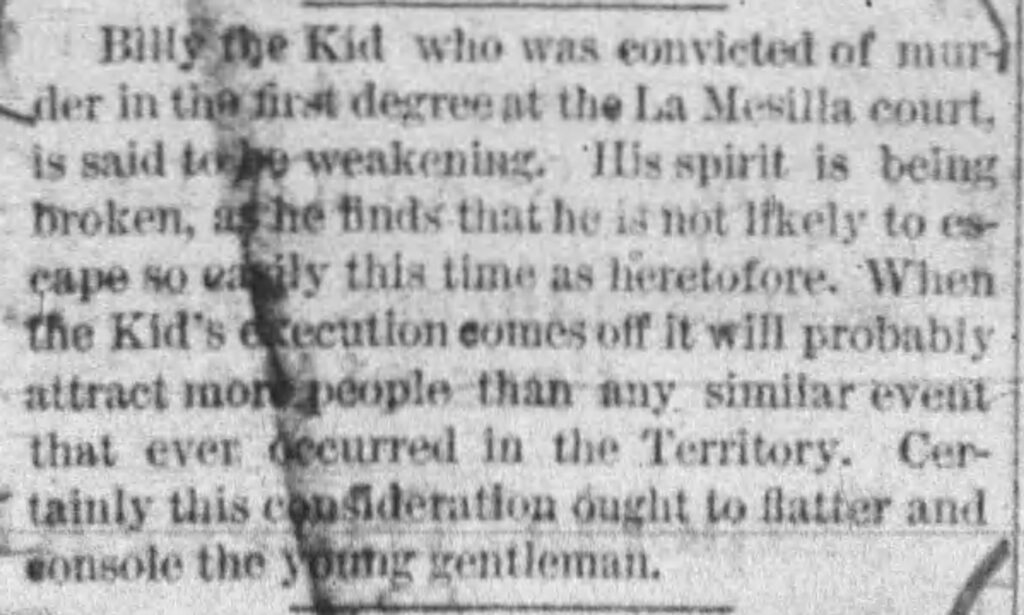
On April 15, 1881 the Mesilla News Interviewed Henry after his trial.
Well, I had intended at one time to not say a word in my own behalf, because persons would say, ‘Oh, he lied’; Newman [editor of a Las Cruces newspaper] gave me a rough deal; has created prejudice against me, and is trying to incite a mob to lynch me. He sent me a paper which shows it; I think it a dirty, mean advantage to take of me considering my situation and knowing I could not defend myself by word or act. But I suppose he thought he would give me a kick down hill. Newman came to see me the other day; I refused to talk to him or tell him anything; but I believe the News is always willing to give its readers both sides of a question.
If mob law is going to rule, better dismiss judge, sheriff, etc., and let all take chances alike. I expected to be lynched in going to Lincoln. Advise persons never to engage in killing.
Think you will be taken through safe? Do you expect a pardon from the Governor?
Considering the active part Wallace took on our side and the friendly relations that existed between him and me, I think he ought to pardon me. Don’t know that he will do it. When I was arrested for that murder, he let me out and gave me freedom of the town and let me go about with my arms. When I got ready to go I left. Think it hard that I should be the only one to suffer the extreme penalties of the law.
Here the sheriff led us away and said we had talked long enough.
On April 15, 1881 after his trial and death sentence, Henry made one last attempt for outside help. He wrote to attorney Edgar Caypless.
Dear Sir
I would have written before this but could get no paper. My United States case was thrown out of court and I was rushed to trial on my Territorial Charge. Was convicted of murder in the first degree and am to be hanged on the 13th of May. Mr. A.J. Fountain was appointed to defend me and has done the best he could for me. He is willing to carry the case further if I can raise the money to bear his expense. The mare is about all I can depend on at present so hope you will settle the case right away and give him the money you get for her. If you do not settle the matter with Scott Moore and have to go to court about it, either give him (Fountain) the mare or sell her at auction and give him the money. Please do as he wishes in the matter. I know you will do the best you can for me in this. I shall be taken to Lincoln tomorrow. Please write and direct care to Garrett sheriff. Excuse bad writing I have my handcuffs on. I remain as ever.
Yours Respectfully
W.H.Bonney
April 20, 1881 article from the Newman’s Semi-Weekly. Henry and his guards are preparing to leave Mesilla for Lincoln.
“On Saturday night about 10 o’clock Deputy U.S. Marshall Robert Olinger with Deputy Sheriff Woods and a posse of five men (Tom Williams, Billy Mathews, John Kinney, D.M. Reade and W.A. Lockhart) started for Lincoln with Henry Antrim alias The Kid. The fact that they intended to leave at that time had been purposely and the report circulated that they would not leave before the middle of the week in order to avoid any possibility of trouble, it having been rumored that the Kid’s band would attempt a rescue. They stopped in front of our office (Semi-Weekly) while we talked to them, and we handed the Kid an addressed envelope and some paper and he said he would write us some things he wanted to make public. He appeared quite cheerful and remarked that he wanted to stay with the boys until their whiskey gave out. Said he was sure his guard would not hurt him unless a rescue should be attempted and he was certain that would not be done unless perhaps ‘those fellows over at White Oaks come out to take me,’ meaning to kill him. It was, he said, about a stand-off whether he was hanged or killed in the wagon. The Mesilla jail was the worst place he had ever struck. The sheriff wanted him to say something good about it when he left but he had not done so. He wanted to say something about John Chisum and it was some satisfaction to him to know that some men would be punished after he had been hanged. He was handcuffed and shackled and chained to the back seat of the ambulance. Kinney sat beside him; Olinger on the seat facing him. Mathews faced Kinney; Lockhart driving, and Reade, Woods and Williams riding along on horseback on each side and armed to the teeth, and any one who knows these of whom it was composed will admit that a rescue attempt would be hazardous undertaking. Kid was informed that if any trouble should occur he would be shot first and the attacking party attended to afterwards.”
Henry was transported to Lincoln and confined to a room on the second floor of the former Murphy store.
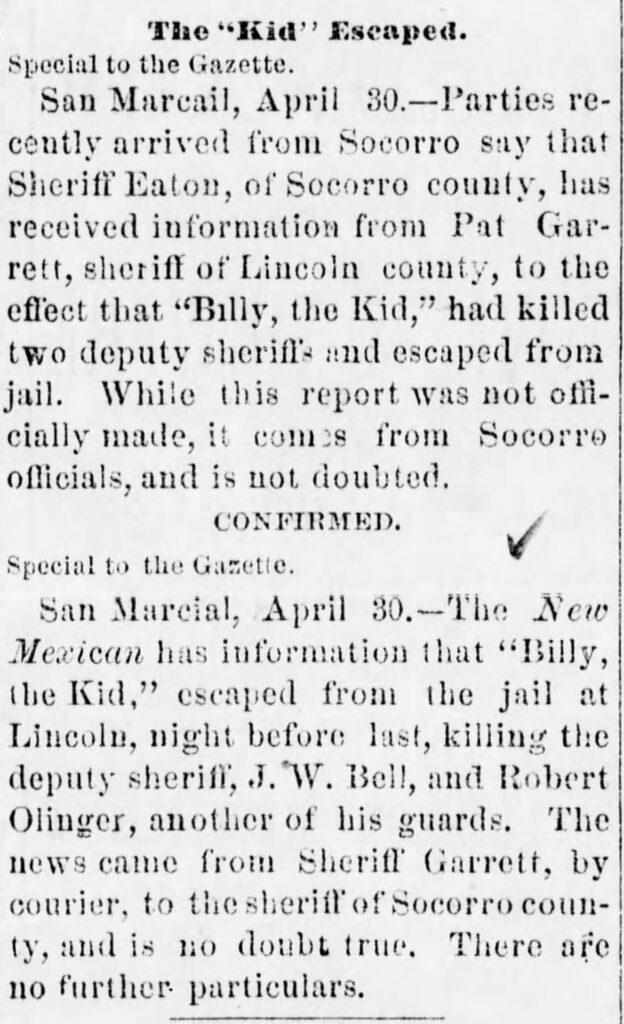
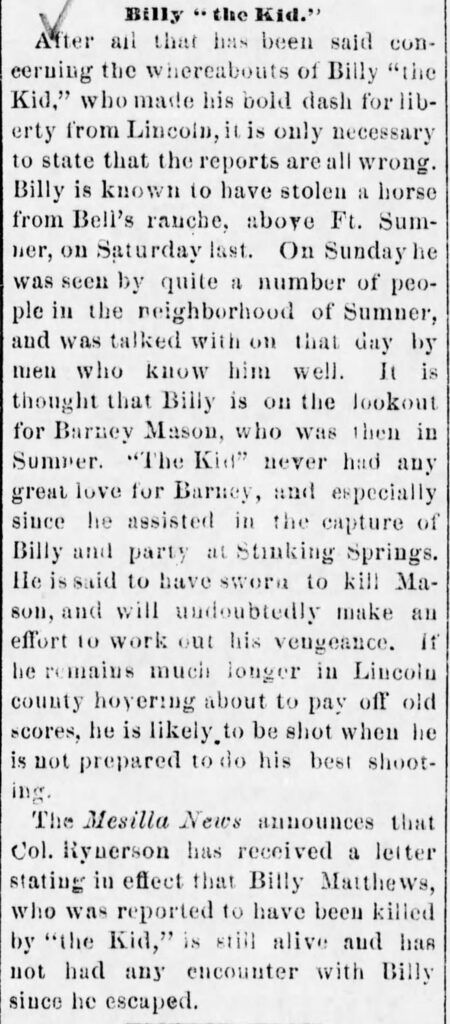
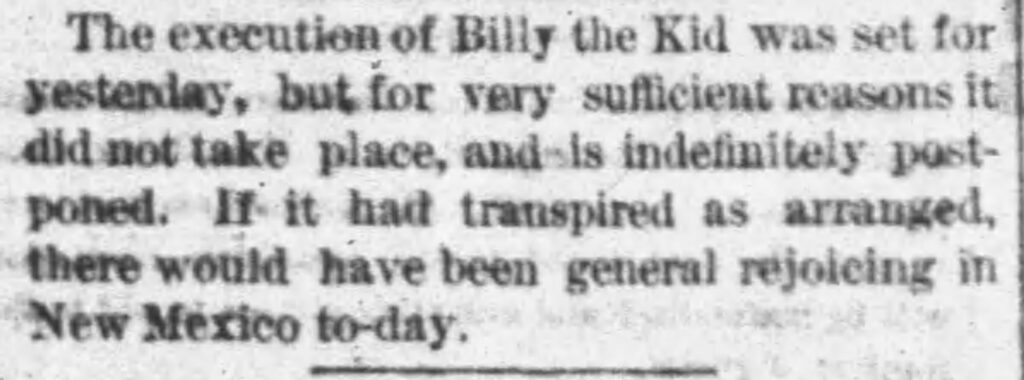
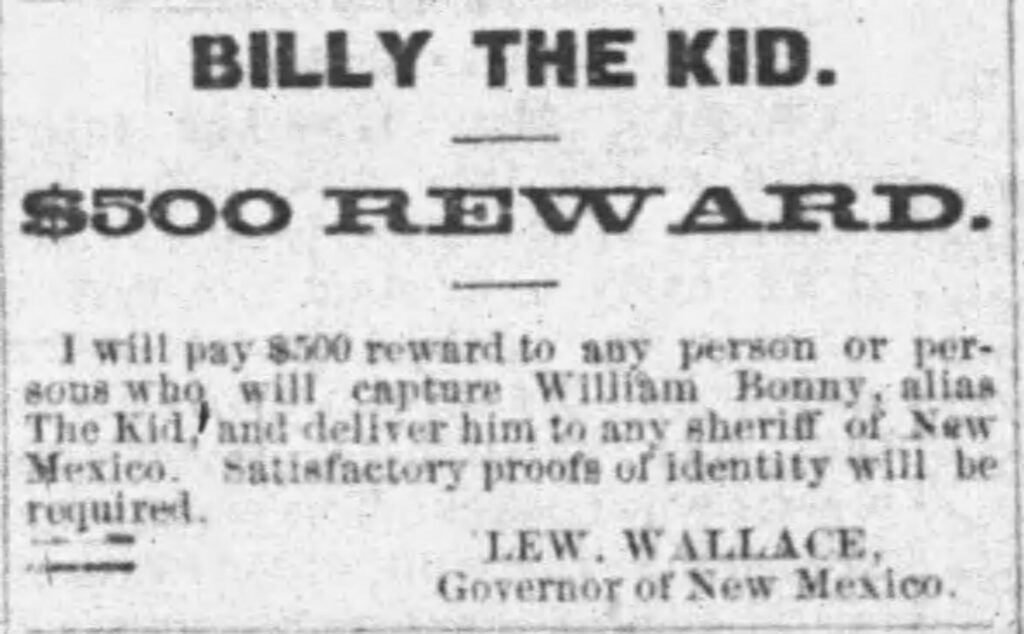
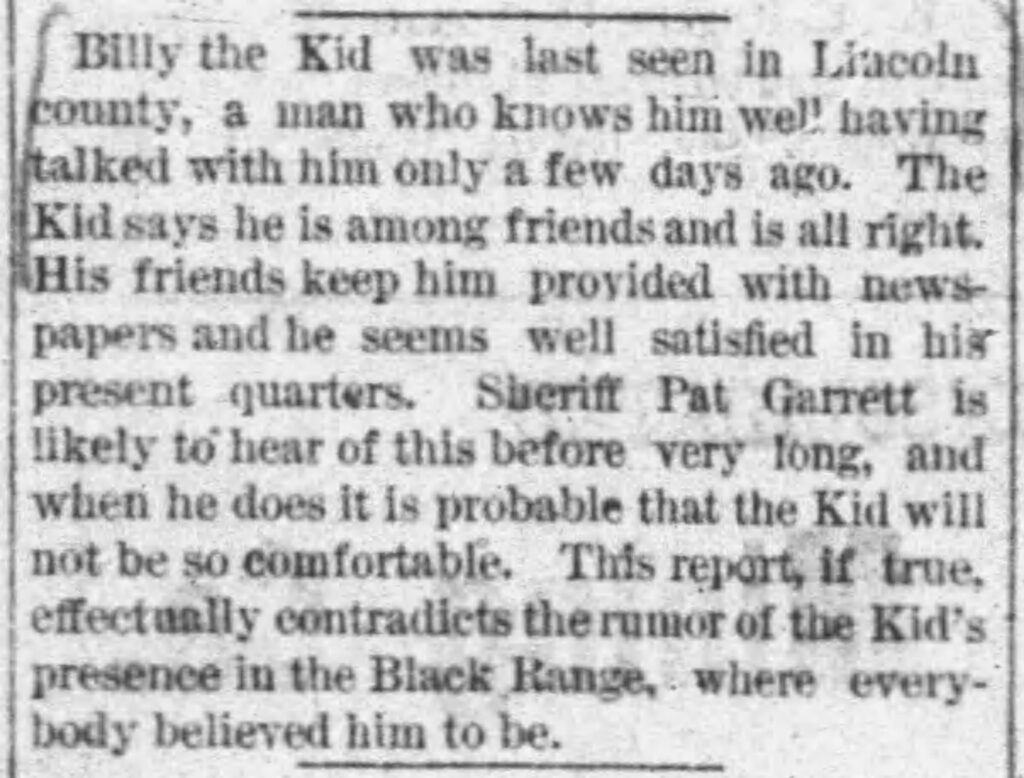
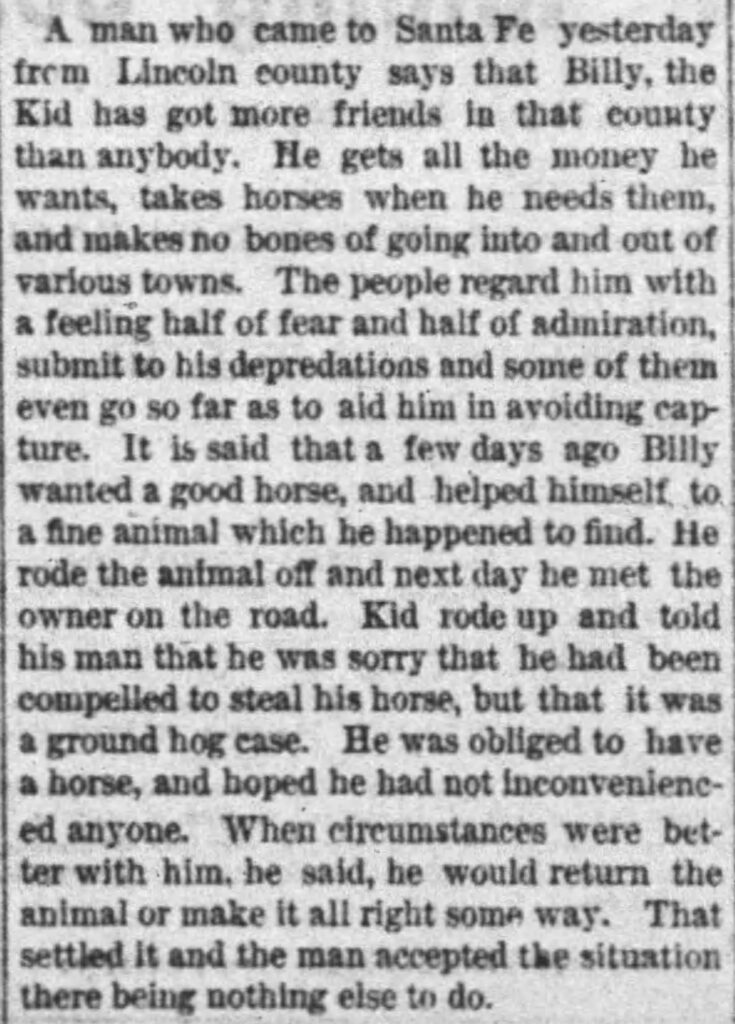
July 14, 1881: Henry McCarty Killed by Pat Garrett


How it Happened: First-Hand Account by John W. Poe
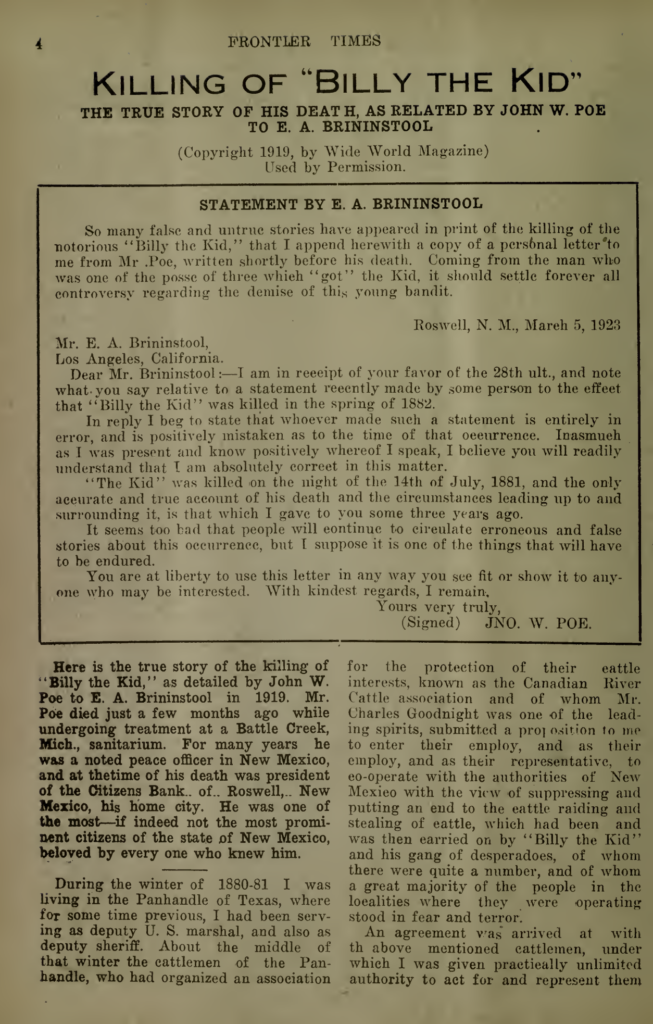
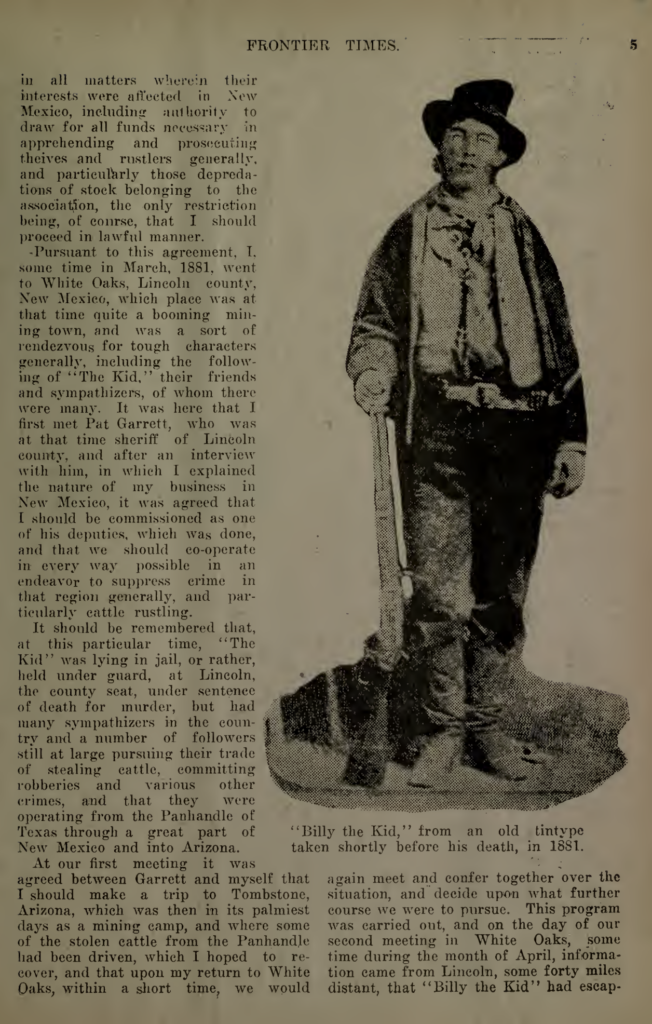
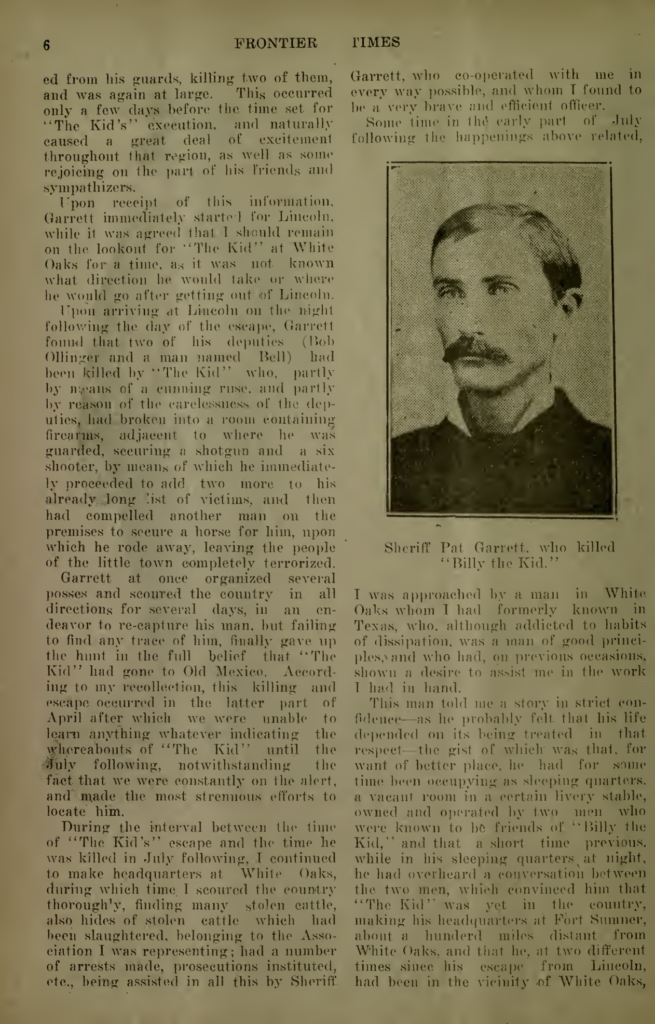
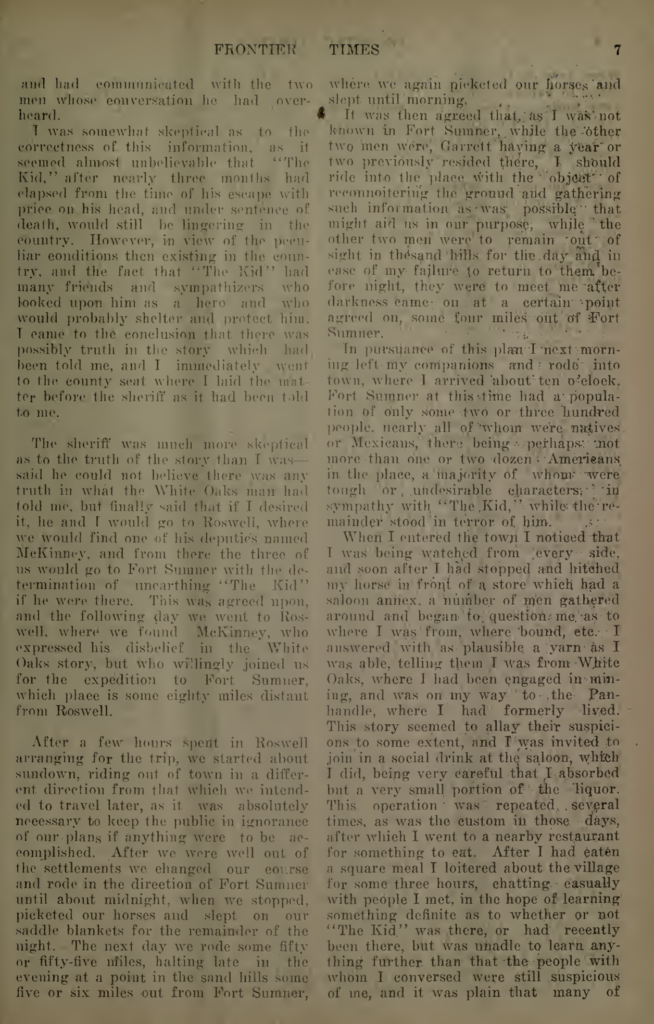
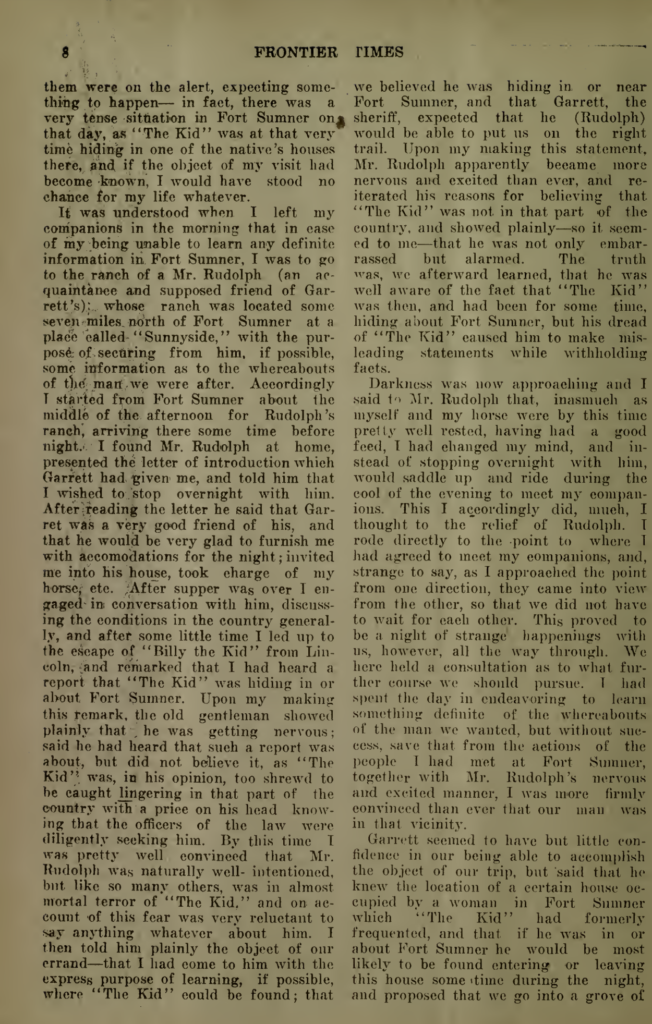
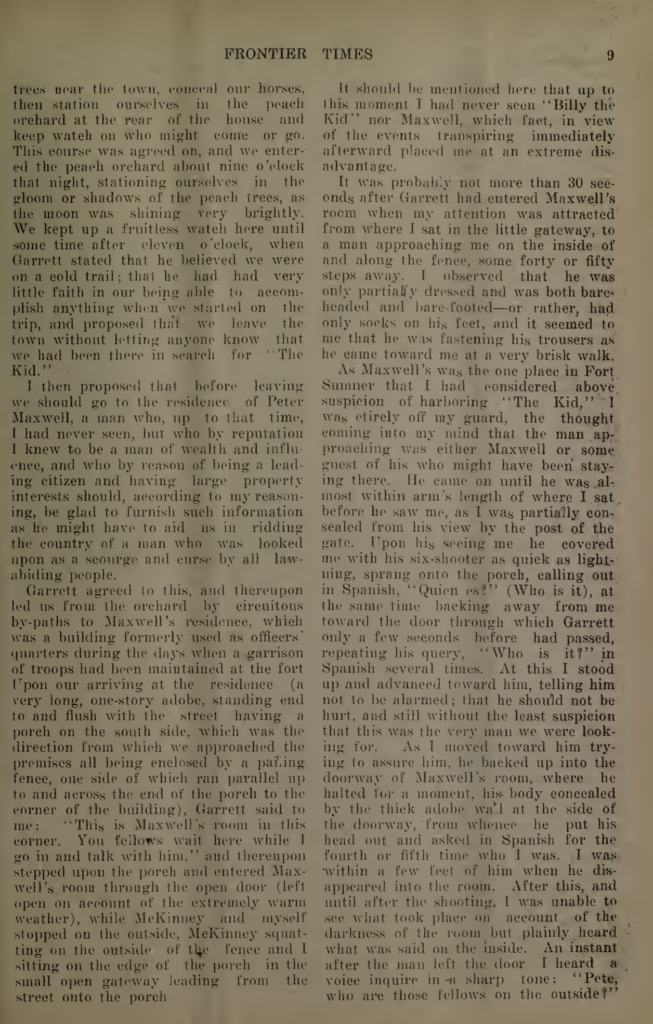
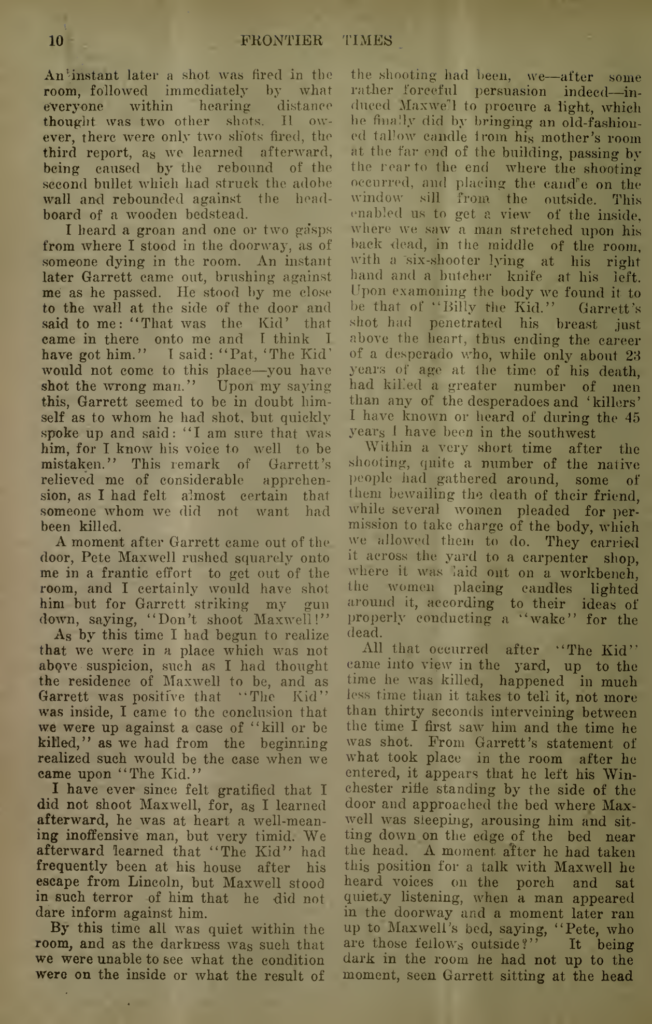
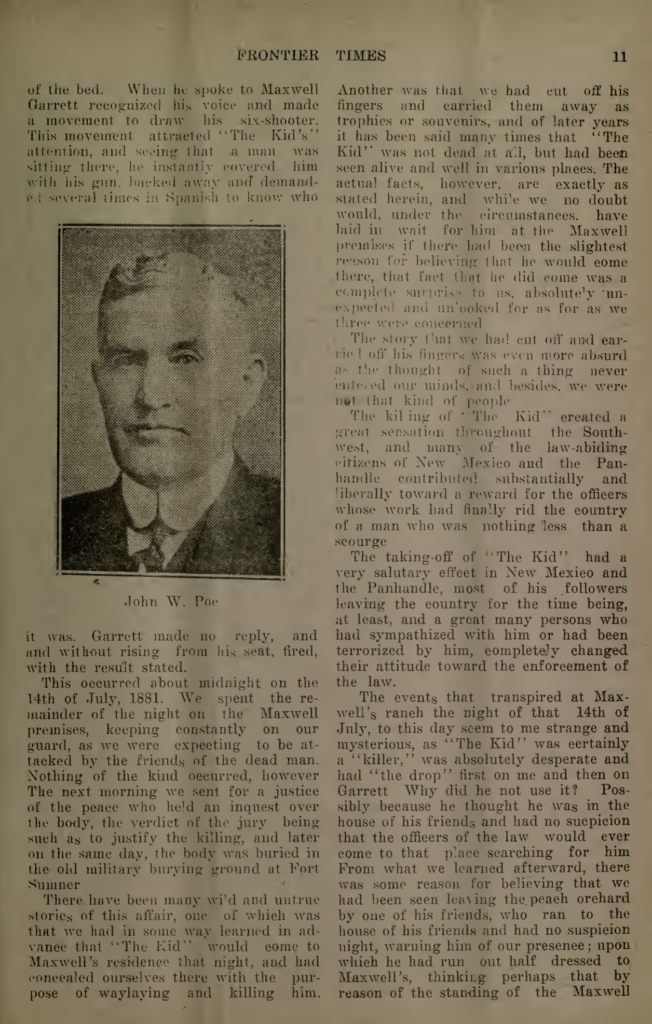
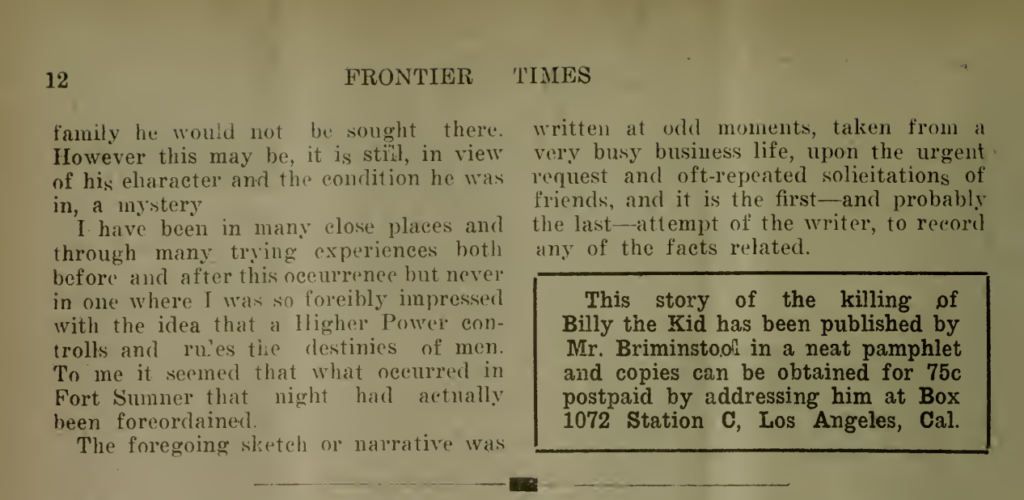
More Eyewitness Accounts
“It was the night of July 14, 1881. It had been a hot day throughout the valley and Mesa Redondo country. I had strolled over to a neighbor’s house and on my return had stopped under a Cottonwood tree for a moment, when the Kid, whom I had known for some time, strolled up. He had just ridden into town. He was hot and tired and we drank beer together. He told me he was hungry and that he was going to the home of Don Pedro Maxwell for a cut of fresh beef for his supper, which was being prepared at a nearby house. We parted there and in a few minutes there were shots. The news soon spread that Garrett had shot the Kid at Maxwell’s home. I ran over there and Garrett, who had run out of the house, told me to go in and see if the Kid was dead. There on the floor, we (Silva and Deluvina) saw Billy stretched out, face down. We turned him over, and when Deluvina realized fully it was the Kid, she began to cry bitterly, interspersing with her tears the vilest curses she could bestow on the head of Pat Garrett (who may have just walked in and noticed the Kid was now lying on his back, which will explain his version of how the Kid’s body was position). We asked permission to remove the body, Pete Maxwell suggesting removal to the old carpenter’s shop. We laid the body on the carpenter’s bench and placed candles around the corpse. [Shortly before the Kid was killed…] We had heard strange voices coming from the peach orchard but had given no thought to who it might be. If we had, the Kid’s life might have been saved. It was Pat Garrett and his two deputies. Billy would not have walked into the trap laid for him. Someone in Fort Sumner must have given Billy away. I have heard reports which say that Billy the Kid is still alive. I know that Pat Garrett killed the Kid on July 14, 1881, in Pete Maxwell’s bedroom. I also know with absolute certainty that he was buried in the old graveyard the next day.” – Jesus Silva, Fort Sumner resident and friend, commenting on the events that led to the killing of Billy the Kid.
“He (Garrett) was afraid to go back to the room to make sure of whom he had shot! I went in and was the first to discovered that they had killed my little boy. I hated those men and am glad that I have lived long enough to see them all dead and buried.” – Deluvina Maxwell, resident of Fort Sumner and friend commenting on the night the Kid was killed.
“Billy had been very popular at Fort Sumner and had a great many friends, all of who were indignant towards Pat Garrett. If a leader had been present, Garrett and his two officers would have received the same fate they dealt Billy.” – Frank Lobato, friend and Fort Sumner resident, commenting on the night the Kid was killed.
“I was at Fort Sumner the night Billy the Kid was killed. I went to the carpenter’s shop and stood at the wake all that night. Jesus Silva made a wooden box, which served as the coffin for the Kid. The next day Silva and I dug the Kid’s grave and buried the body in the old graveyard. I know the exact spot of Billy’s burial thought I have not been to the graveyard for many years.” – Vicente Otero, Fort Sumner resident. Helped dig the Kid’s grave.
Recollections of The Kid
Frank Coe- (A Regulator and close friend) “The Kid stayed with me at my home for most of one winter, during which time we became staunch friends. I never enjoyed better company. He was humorous and told me many amusing stories. He always found a touch of humor in everything, being naturally full of fun and jollity. Though he was serious in emergencies, his humor was often apparent even in such situations. Billy stood with us to the end, brave and reliable, one of the best soldiers we had. He never pushed in his advice or opinions, but he had a wonderful presence of mind; the tighter the place the more he showed his cool nerve and quick brain. He was a fine horseman, quick and always in the lead, at the same time he was kind to his horses and could save them and have them ready and fresh when he needed to make a dash. He never seemed to care for money, except to buy cartridges with; then he would prefer to gamble for then straight. Cartridges were scarce, and he always used about ten times as many as anyone else. He would practice shooting at every thing he saw and from every conceivable angle, on and off his horse. He never drank. He would go to the bar with anyone, but I never saw him drink a drop, and he never used tobacco in any form (that last remark is debatable -while some say he didn’t, some say the Kid did use tobacco and was a social drinker, but the Kid could’ve picked up those habits after his relationship with the Coe cousins). Always in a good humor and ready to do a kind act for some one.”
George Coe- (Another Regulator and close friend) “Billy was a brave, resourceful and honest boy; he would have been a successful man under other circumstances. I loved the youngster in the old days, and can say now, after the passing fifty years, that I still love his memory. When Billy was killed in 1881 by Pat Garrett, I was in Rio Arriba County. Though I heard the news with sorrow, it was by no means a surprise. His opponents were constantly on his trail, making his capture and killing merely a question of time. It was impossible for him to work or make an honest livelihood; otherwise many of his friends would gladly have hired him and given him a chance to settle down under Governor Wallace’s’ terms of pardon. But the Kid was never permitted to halt his career. His enemies were determined to have his life and would not stop until they had taken it. He was compelled to live the life of an outlaw, though his outlawry consisted more of stealing cattle than of killing. Cattlemen were organizing their associations and employing men to rid the country of thieves, of which Billy the Kid was by no means the most outstanding. But because he was so well-known, he became the target of the officers. The motive behind Pat Garrett’s relentless pursuit of the Kid was that his death meant money and the office of sheriff of Lincoln County. The Kid was a thousand times better and braver than any man hunting him, including Pat Garrett.”
Susan McSween- (Alex McSween’s wife) “Billy was not a bad man; that is, he was not a murder who killed wantonly. Most of those he did kill deserved what they got. Of course, I cannot very well defend his stealing of horses and cattle; but, when you consider that the Murphy, Dolan, and Riley people forced him into such a lawless life through efforts to secure his arrest and conviction, it is hard to blame the poor boy for what he did. One thing is certain- Billy was as brave as they make them and knew how to defend himself. He was charged with practically all the killings in Lincoln County in those days, but that was simply because his name had become synonym for daring and fearlessness. When Sheriff William Brady was killed, we all regretted it, not that any of us cared much about the sheriff, but because of the manner in which it was done. Quite naturally, the killing ofthe representative of justice turned many or our friends against us and did our side more harm in the public mind. Brady was killed by a number of bullets, being shot at by the whole bunch of men hidden behind the adobe wall of the corral in the rear of Tunstall/McSween store. I understood at the time that Billy said he tried to get Bill Matthews, who was walking with Brady, and did not even aim at Brady. I think his subsequent conviction for killing Sheriff Brady was based on insufficient evidence and was most unjust. I have believed that if Mr. Tunstall had lived, Billy, under his guidance, would have become a valuable citizen, for he was a remarkable boy, far above the average of the young men of those times and he undoubtedly had the making of a fine man in him.”
Hijinio (Yginio) Salazar- (Regulator and close friend) “Billy the Kid was the bravest man I ever knew. He did not know what fear meant. Everyone who knew him loved him. He was kind and good to poor people, and he was always a gentleman, no matter where he was. When in danger, he was the coolest man I ever saw- he acted like a flash from a gun. He was quick as kitten and when he aimed his pistol and fired, something dropped; he never missed his mark. I lived in Fort Sumner for a while and know many people there who saw Billy’s body after Pat Garrett killed him. I have read some of the accounts claiming he is alive, but I don’t believe them. It is possible that another Billy the Kid might be living and that he might be seeking to connect himself with the famous Billy the Kid. However, there is absolutely no doubt in my mind about William H. Bonney, the Billy the Kid I knew and fought with, having been killed by Pat Garrett in Pete Maxwell’s bedroom.”
Carlota Baca Brent- (A former resident of Lincoln County in a 1938 interview) “Today the Keed is featured as a mean man, as dark as a Mexican, he wasn’t he was a light complexion boy that was always smiling; he was brave and loyal to his friends. The Keed was gone but many Spanish girls mourned for him.”
Lily Casey Klasner- (She didn’t have much fondness for the Kid since he killed her boyfriend Bob Olinger, but even she admitted he had good qualities) “The Kid had a great personality, and could ingratiate himself in peoples good graces very quickly. He had laughing blue eyes always smiling or laughing, quick and more accommodating very good hearted, had an innocent timid look all of this took with the girls at once.”
Dr. Henry Hoyt- (A friend of Billy the Kid)“Billy was an expert at most Western sport, with the exception of drinking. He was a handsome youth with a smooth face, wavy brown hair, an athletic and symmetrical figure, and clear blue eyes that could look one through and through. Unless angry, he always seemed to have a pleasant expression with a ready smile. His head was well shaped, his features regular, his nose aquiline, his most noticeable characteristic a slight projection of his upper front teeth. He spoke Spanish like a native, and although only a beardless boy, was nevertheless a natural leader of men. With his poise, iron nerve, and all-round efficiency properly applied, the Kid could have made a success anywhere.”
Martin Chavez- (In a interview with Miguel Otero Jr. author of “The Real Billy the Kid” in the mid 1930s) “ Most of the accounts of the Lincoln County War are far from true. The stories I have read were written by Pat Garrett, Charlie Siringo, Harvey Fergusson and Walter Noble Burns. I have also read the account of the killing of the Kid, published by E.A. Brininstool, which is correct. It was written by John Poe, who was with Garrett. All the other accounts are filled with inaccuracies and discrepancies, and do no justice to the Kid. All the wrongs have been charged to Billy, yet we who really knew him, know that he was good and had fine qualities. We have not put our impressions of him into print and our silence has been the cause of great injustice to the Kid.”
John Meadows- (A Lincoln County resident and friend) “He must have had good stuff in him, for he was always an expert at whatever he tried to do. When he was rough, he was rough as men ever get to be…too awful rough at times, but everything in the country was rough back then. He done some things I can’t endorse, but Kid certainly had good feelings.” On the Kid’s killing of Bell and Olinger: “Kid told me exactly how it was done. He said he was lying on the floor on his stomach, and shot Bell as he ran down the stairs. Kid said of this killing, ‘I did not want to kill Bell, but I had to do so in order to save my own life. It was a case of having to, not wanting to.’” As for Olinger, Meadows recalls the Kid saying: “I stuck the gun through the window and said, ‘Look up, old boy, and see what your getting,’ Bob looked up and I let him have both barrels right in the face and breast. I never felt so good in all my life as I did when I pulled the trigger and saw Olinger fall to the ground.” Meadows… “Olinger was mean to him. In talking about it with me, Kid said, ‘He used to work me up until I could hardly contain myself.’”
Reminiscing
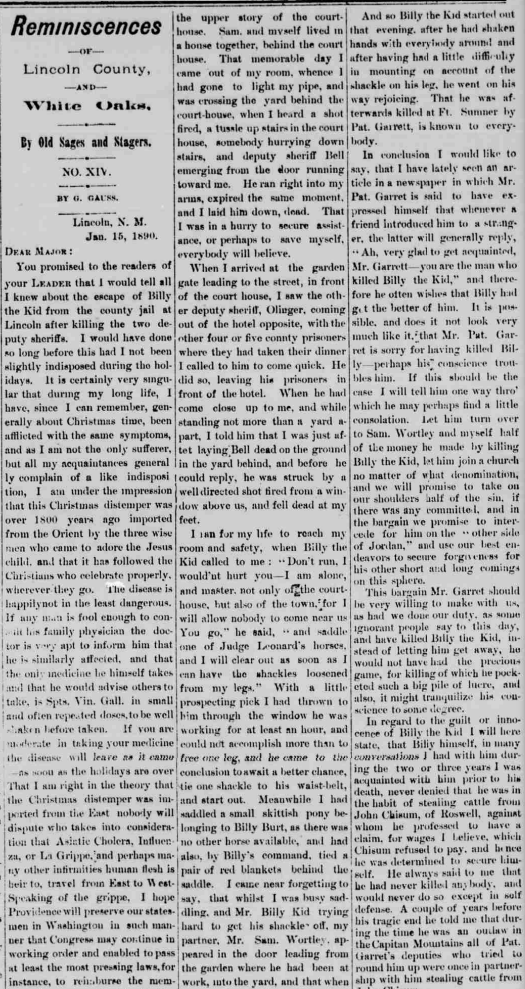
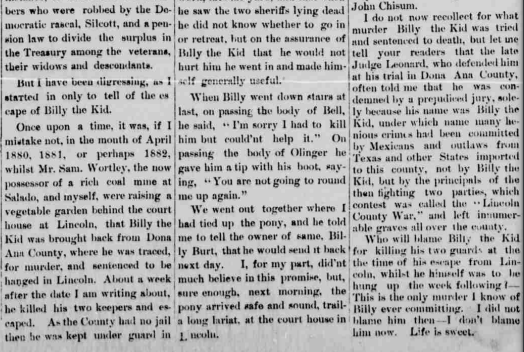
McCarty Home and Main Street Washed Away in Silver City Flood
In 1895 Main Street in Silver City was turned into a large ditch after a flood washed away the street and many of the structures that faced it on either side. The structures that partially survived the flood were deemed unsafe and demolished. The O.S. Warren house on the west side of the Big Ditch at Market Street is the only original Main Street structure that survived the flood of 1895. The former Main Street is now called San Vincente Arroyo, or “The Big Ditch.”
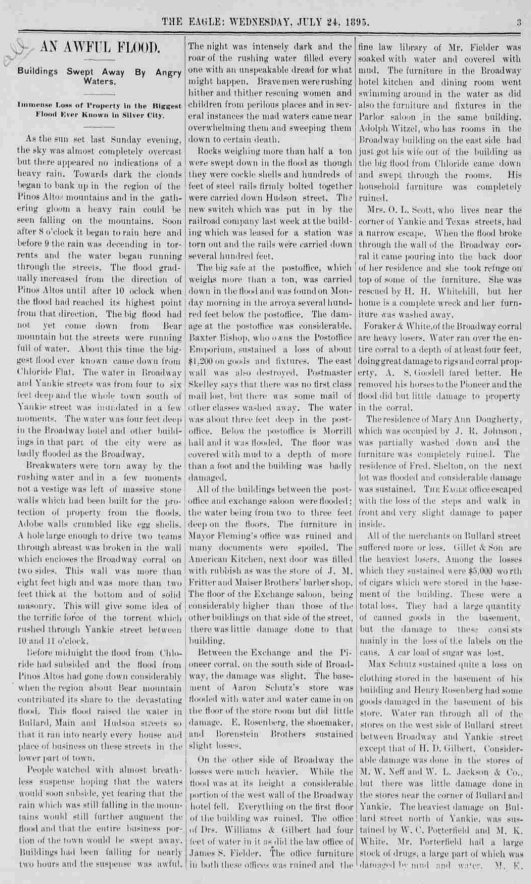


Henry’s Brother, Joseph McCarty.
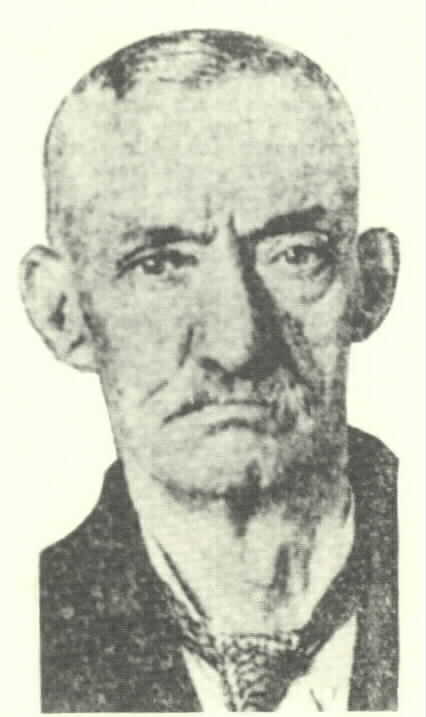
Joseph eventually left Silver City and went to Arizona, perhaps to mine with his stepdad. He then moved to Trinidad, Colorado in 1880 to work as a gambler.
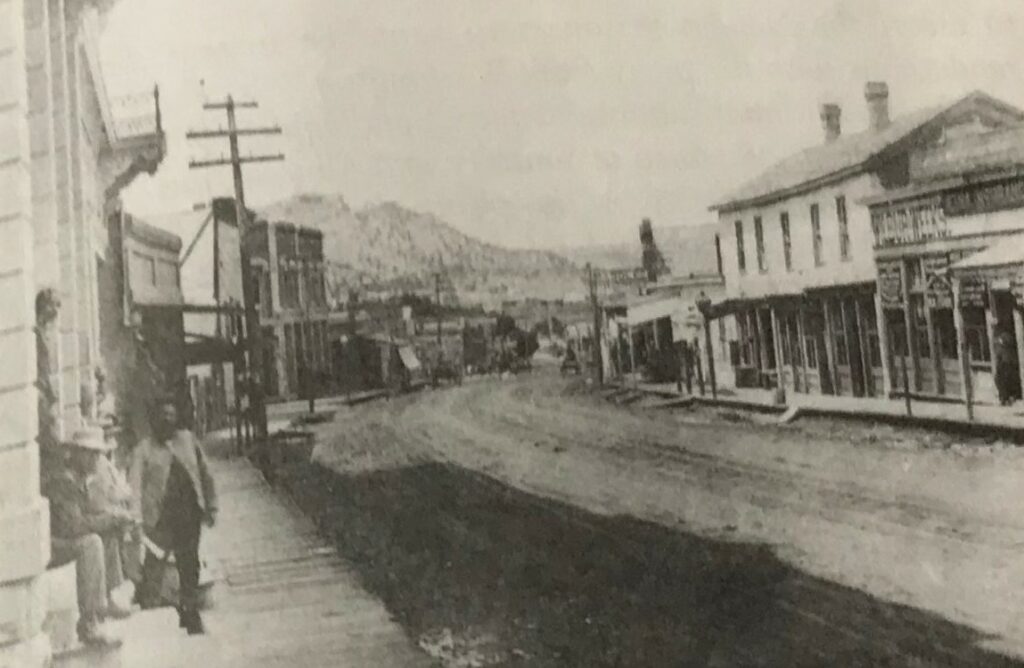
It appears that Joseph also spent some time in Silverton, Colorado working as a miner.

While living in Trinidad, Colorado, Joseph heard of his brother’s death. He swore to kill Pat Garret on site, however, in August of 1882 Joseph met up with Garrett at the Armijo House in Albuquerque.
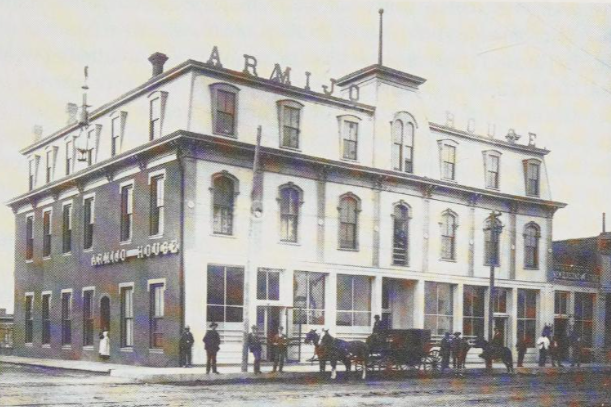
The two spoke for a couple of hours and then parted on friendly terms.
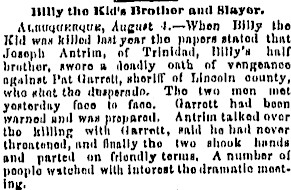
An Albuquerque Evening Review reporter who heard of the incident asked Garrett the next morning what he and Antrim talked about. Garrett replied that Antrim wanted to talk about the killing of his brother, and that he denied that he harbored any ill feelings against the lawman. Garrett said that he told Antrim that he had only done his duty, and should not be hated for it. “We parted the best of friends,” Garrett told the reporter.
In 1883 Joseph headed to Silver City, New Mexico. It’s said he stopped a lynching there and was also almost killed by a fellow gambler a few months later. Joseph then went to Tombstone, Arizona and eventually headed for Denver.

He might have married a women in Pueblo, Colorado named Jennie Small in 1891 and fathered a son named Claudie Stone.
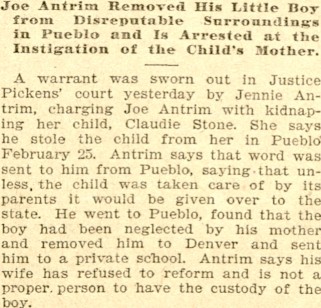
Joseph first shows up in the Denver City Directory in 1893 . He resided at various places in Denver throughout the remainder of his life. According to city directories these include 1517 Arapahoe (1893), 2236 Lawrence (1894), 1626 Larimer (1897), 1634 Larimer (1899), 1822 Arapahoe (1901), 1928 Lawrence (1903, 1914), 611 17th St. (1917), and 1530 Market Street (1912, 1916, 1918-19, 1922, 1924-27).
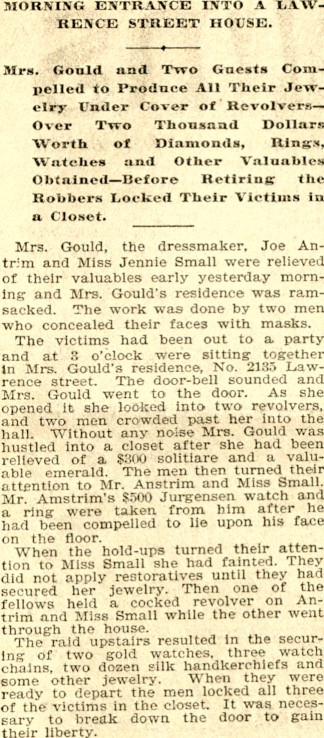
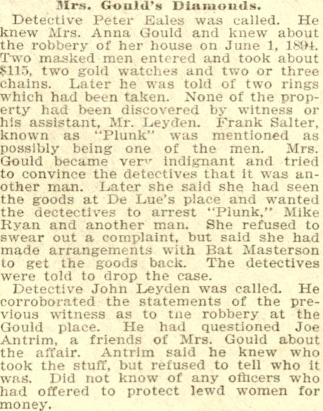


In 1928 the Denver Post published an article by journalist Ed Hoover on Joseph, but apparently the journalist didn’t know who he was interviewing and nothing about his brother was mentioned. After the article was published it was pointed out to the journalist that he had interviewed the brother of Billy the Kid. The journalist replied, “so what.”
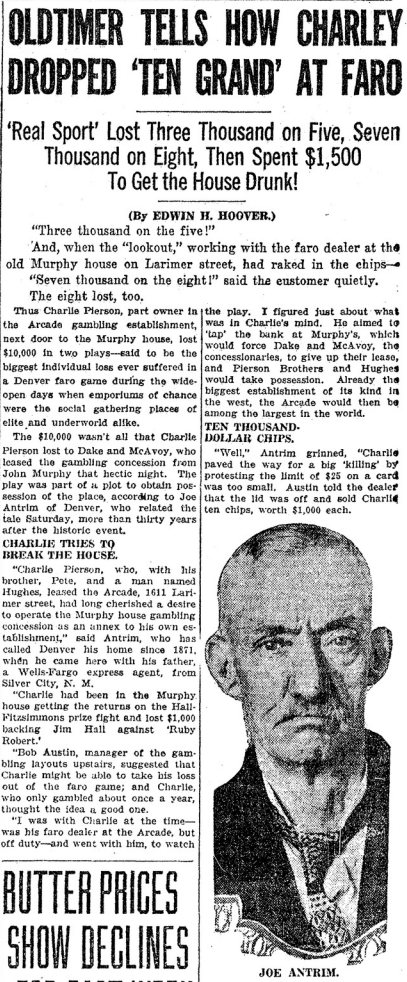

In 1930 Joseph was staying in a room at the Dewey House located at 1617 Larimer Street, where he died on November 25, likely from a stroke. He was 76 years old.
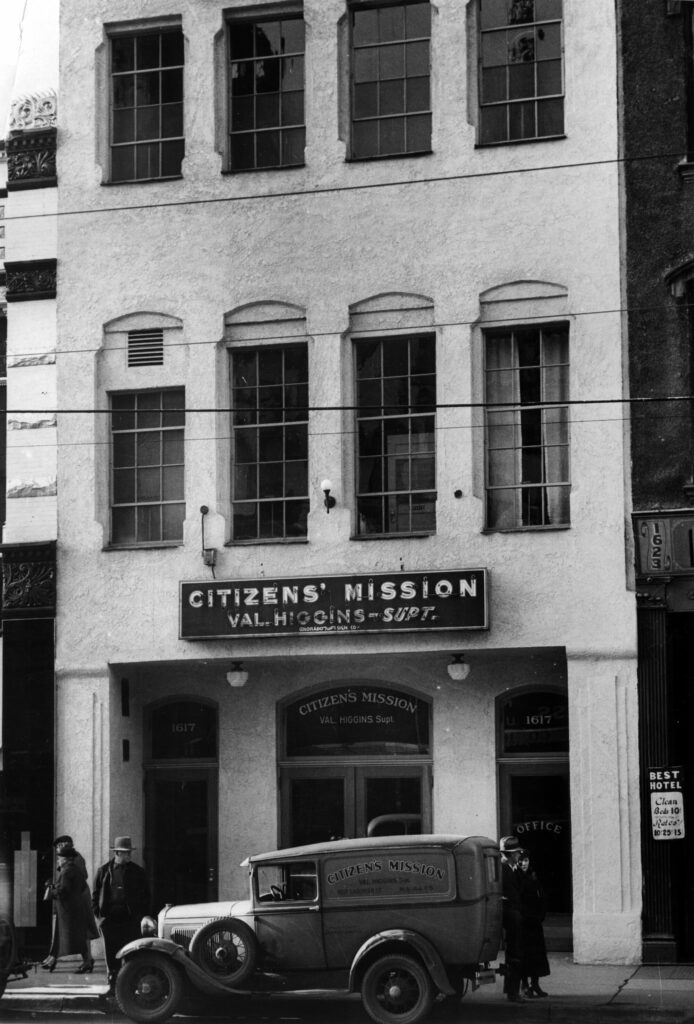
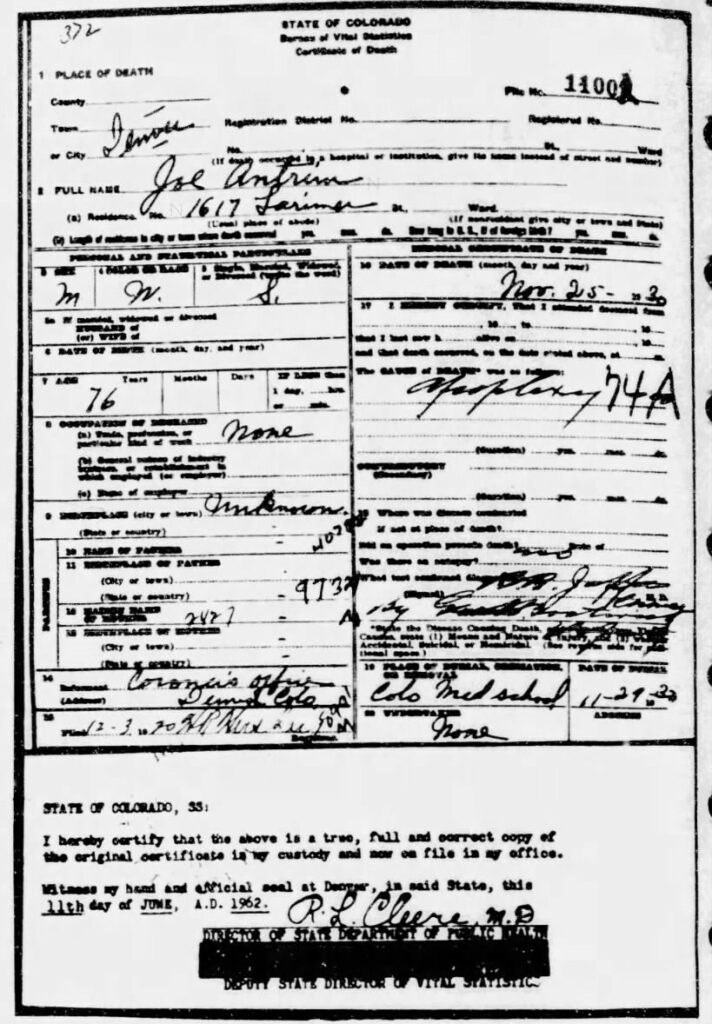
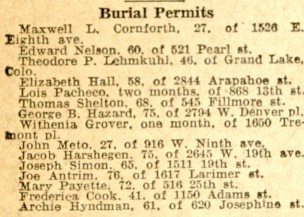
Joseph’s body went unclaimed and was donated to the Colorado Medical School for science.

Joseph’s body was received by the medical school on November 29, 1930. It was later cremated and interred, along with the remains of other individuals whose bodies were donated to science, at the historic Pioneer Cemetery in Aurora, Colorado, now called the Melvin-Lewis Cemetery. The small cemetery is located near the intersection of Parker and Chambers, surrounded by shops and restaurants.
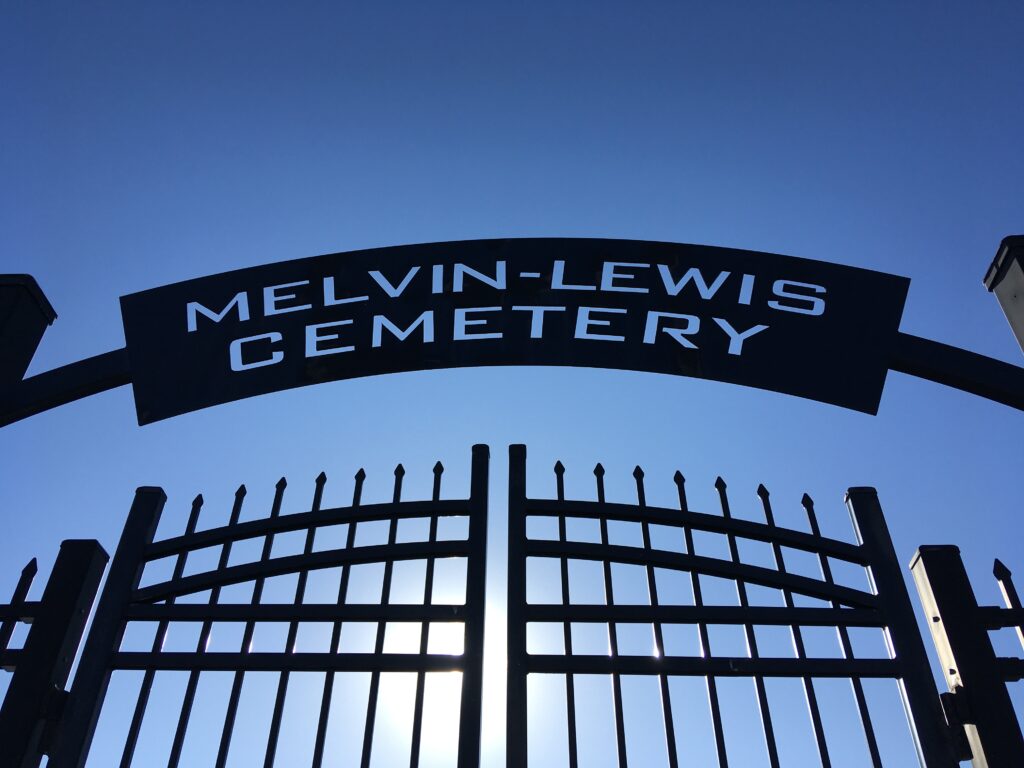
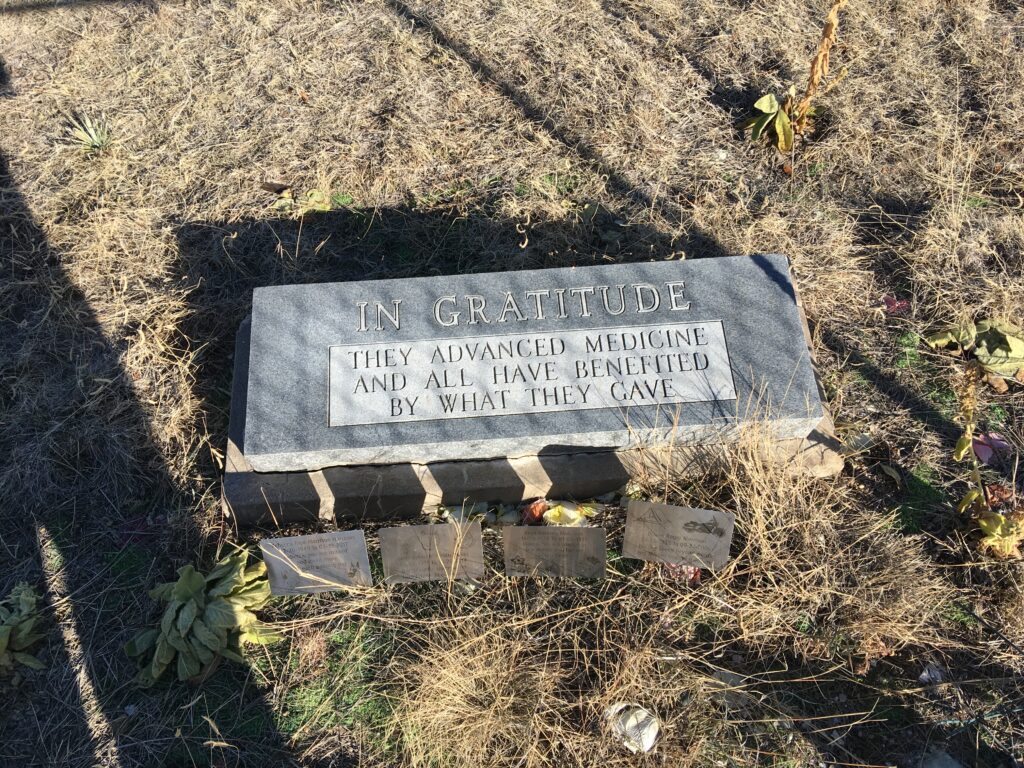
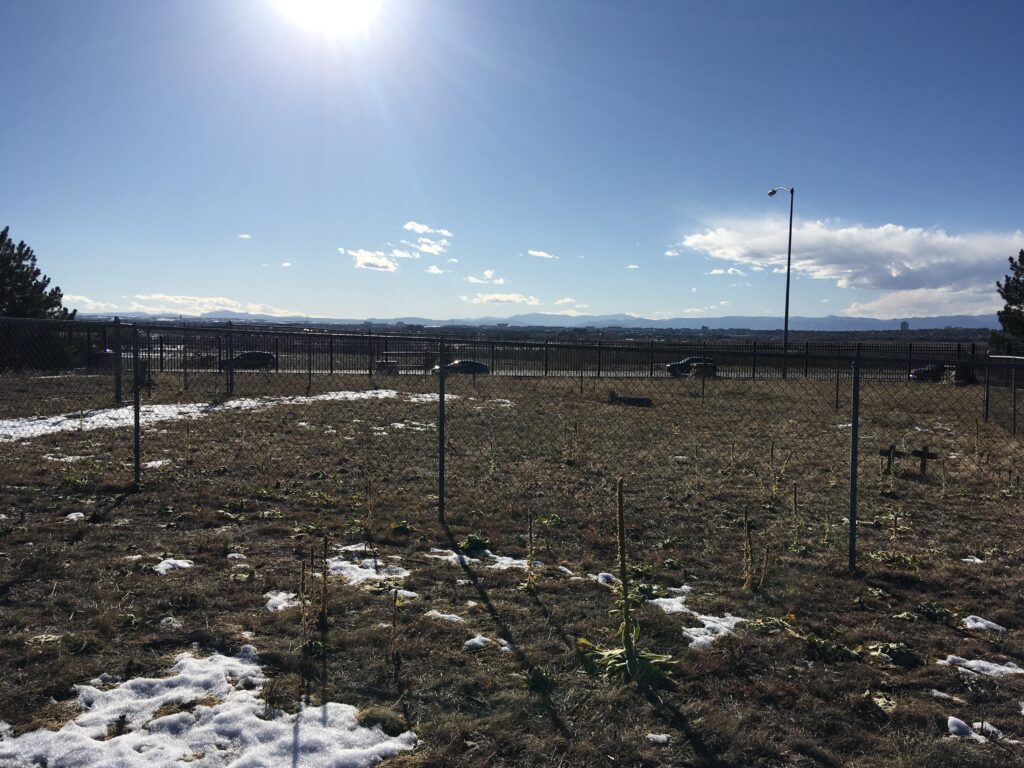
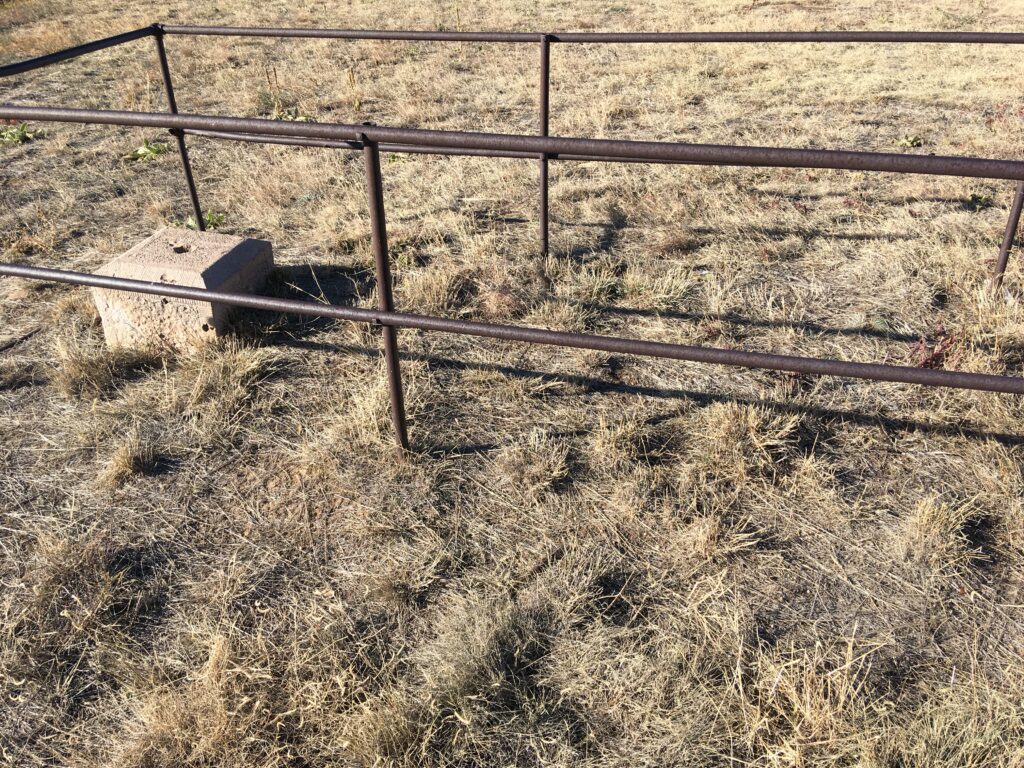
Death of Step-father William Antrim
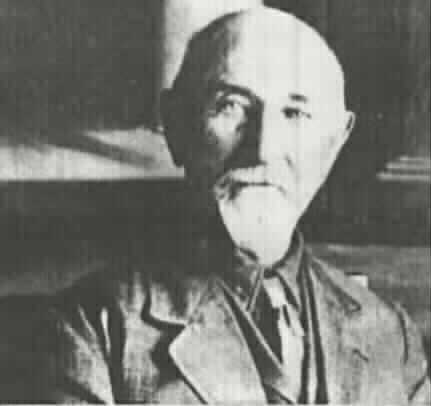
William Antrim eventually ended up in Adelaida, California living with the daughter of his sister Mary Ann. William Antrim died there on December 10, 1922 (aged 80).
